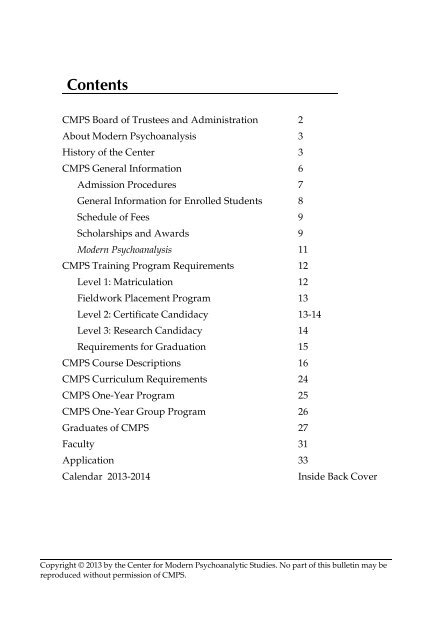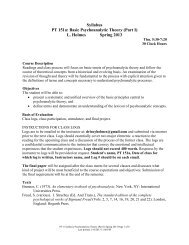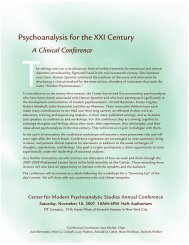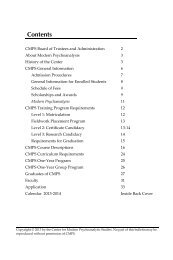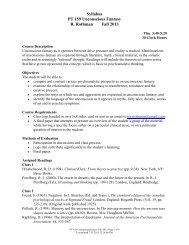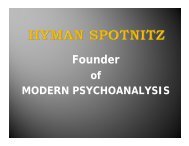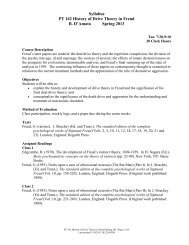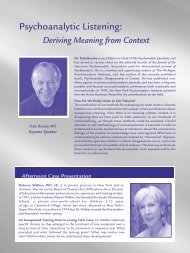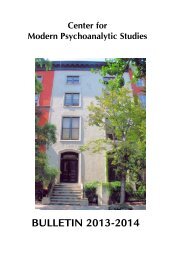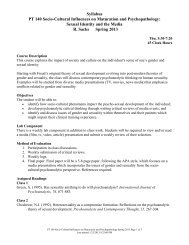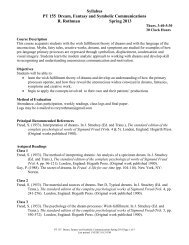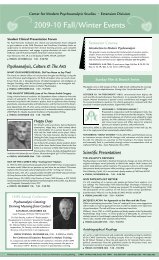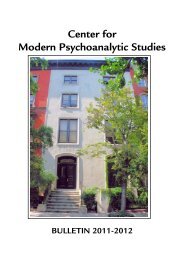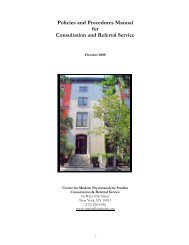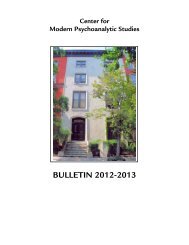Contents - Center for Modern Psychoanalytic Studies
Contents - Center for Modern Psychoanalytic Studies
Contents - Center for Modern Psychoanalytic Studies
Create successful ePaper yourself
Turn your PDF publications into a flip-book with our unique Google optimized e-Paper software.
<strong>Contents</strong><br />
CMPS Board of Trustees and Administration<br />
About <strong>Modern</strong> Psychoanalysis<br />
History of the <strong>Center</strong><br />
CMPS General In<strong>for</strong>mation<br />
Admission Procedures<br />
General In<strong>for</strong>mation <strong>for</strong> Enrolled Students<br />
Schedule of Fees<br />
Scholarships and Awards<br />
<strong>Modern</strong> Psychoanalysis<br />
CMPS Training Program Requirements<br />
Level 1: Matriculation<br />
Fieldwork Placement Program<br />
Level 2: Certificate Candidacy<br />
Level 3: Research Candidacy<br />
Requirements <strong>for</strong> Graduation<br />
CMPS Course Descriptions<br />
CMPS Curriculum Requirements<br />
CMPS One-Year Program<br />
CMPS One-Year Group Program<br />
Graduates of CMPS<br />
Faculty<br />
Application<br />
Calendar 2013-2014<br />
2<br />
3<br />
3<br />
6<br />
7<br />
8<br />
9<br />
9<br />
11<br />
12<br />
12<br />
13<br />
13-14<br />
14<br />
15<br />
16<br />
24<br />
25<br />
26<br />
27<br />
31<br />
33<br />
Inside Back Cover<br />
Copyright © 2013 by the <strong>Center</strong> <strong>for</strong> <strong>Modern</strong> <strong>Psychoanalytic</strong> <strong>Studies</strong>. No part of this bulletin may be<br />
reproduced without permission of CMPS.
<strong>Center</strong> <strong>for</strong><br />
<strong>Modern</strong><br />
<strong>Psychoanalytic</strong><br />
<strong>Studies</strong><br />
A New York State Licensure-Qualifying Institute<br />
Dedicated to Training<br />
Since 1971<br />
BULLETIN 2013-2014<br />
Chartered by The Board of Regents<br />
The University of the State of New York<br />
■<br />
Training <strong>Center</strong> and<br />
Administrative Offices<br />
16 West Tenth Street<br />
New York, NY 10011<br />
Phone: (212) 260-7050<br />
Fax: (212) 228-6410<br />
Email: cmps@cmps.edu<br />
Web: www.cmps.edu<br />
■<br />
Consultation and<br />
Referral Service<br />
16 West Tenth Street<br />
New York, NY 10011<br />
Phone: (212) 228-6036<br />
Fax: (212) 228-6410<br />
Email: talkinghelps@cmps.edu<br />
Web: www.cmpstalkinghelps.org
<strong>Center</strong> <strong>for</strong> <strong>Modern</strong> <strong>Psychoanalytic</strong> <strong>Studies</strong><br />
BOARD OF TRUSTEES<br />
Faye Newsome, Chair<br />
Arnold Bernstein<br />
Bernie Cornick<br />
Mimi G. Crowell<br />
William Crowell<br />
Philip Kaplan<br />
Theodore Laquercia<br />
Evelyn J. Liegner<br />
Sam Schacht<br />
Murray Sherman<br />
Arthur Skodnek<br />
Dolores Welber<br />
BOARD OF ADMINISTRATIVE DIRECTORS<br />
Mimi G. Crowell<br />
Ronald Okuaki Lieber<br />
Ellen Barz<br />
June Bernstein<br />
Laura Covino<br />
Barbara D’Amato<br />
Stephen Guttman<br />
Lucy Holmes<br />
Eugene Kalin<br />
Nicole Kirman<br />
Theodore Laquercia<br />
Lynne Laub<br />
Joan Lippincott<br />
Angela Musolino<br />
Faye Newsome<br />
Phyllis Rauch<br />
Rory Rothman<br />
Vicki Granet Semel<br />
Sara Sheftel<br />
Dolores Welber<br />
Robert Welber<br />
Elliot Zeisel<br />
President<br />
Director<br />
Consultation and Referral Service, Clinical Services<br />
Public In<strong>for</strong>mation<br />
Library Services<br />
Extension Division<br />
Registrar<br />
Professional Events<br />
Finance<br />
Research<br />
Special Projects<br />
Admissions<br />
Fieldwork Program<br />
Consultation and Referral Service, Administration<br />
Liaison, Boston Graduate School of Psychoanalysis<br />
One-Year Program<br />
Educational Advisement Liaison<br />
Faculty Library Liaison<br />
Admissions<br />
Continuing Education<br />
Educational Advisement<br />
Library Committee<br />
Group Training<br />
FELLOWS<br />
Mark Buenzle<br />
Milena Cornick<br />
Raúl García<br />
Marzieh Hadavi<br />
William Hurst<br />
Charlotte Melnik<br />
Ioanis Papavassiliu<br />
Jennifer Wade<br />
PROGRAM COORDINATOR<br />
Carol Lerner<br />
Fieldwork Placement<br />
STAFF<br />
Wei Sen Chen<br />
Kabir de Leeuw<br />
Bookkeeper<br />
Administrative Assistant<br />
2
About <strong>Modern</strong> Psychoanalysis<br />
<strong>Modern</strong> psychoanalysis rests upon<br />
the theoretical framework and clinical<br />
approach of Sigmund Freud, who<br />
defined psychoanalysis as any line of<br />
investigation that takes transference<br />
and resistance as the starting point of<br />
its work. It is the name given by<br />
Hyman Spotnitz to describe a body of<br />
developments in the theory of technique<br />
in order to apply the psychoanalytic<br />
method to the treatment of<br />
certain disorders previously thought<br />
to be untreatable by that method. It<br />
has been found to be applicable to all<br />
types of emotional illness including<br />
neuroses, psychoses, borderline<br />
conditions, depression, and character<br />
disorders. The findings of modern<br />
psychoanalysis have contributed new<br />
insights into both the dynamics of<br />
emotional illnesses and the mechanisms<br />
through which the analytic<br />
process cures these conditions.<br />
These theories of the treatment of<br />
emotional illness include: 1) ways that<br />
each patient processes destructive<br />
impulsivity in the analytic setting; 2)<br />
transference repetition including not<br />
only experiences from the oedipal<br />
stage of development but also from<br />
the first two years of life as well as the<br />
prenatal period; 3) the systematic<br />
utilization of patient-induced<br />
countertransference feelings and the<br />
effective use of emotional<br />
interchanges between analyst and<br />
analysand as an important clinical<br />
tool; and 4) use of variations in<br />
technique as necessary to aid in the<br />
understanding of patient dynamics<br />
and to resolve resistance to<br />
personality maturation.<br />
HISTORY OF THE CENTER<br />
In December 1970, the following<br />
analysts and friends of<br />
psychoanalysis met to establish a<br />
<strong>Center</strong> <strong>for</strong> <strong>Modern</strong> <strong>Psychoanalytic</strong><br />
<strong>Studies</strong>: Evelyn Abrams, Dorothy<br />
Bloch, Selwyn Brody, Ethel L.<br />
Goldwater Clevans, Mark E. Clevans,<br />
Irene Kesten, Jacob Kesten, William<br />
Kirman, Evelyn J. Liegner, Leonard<br />
Liegner, Shirley B. Love, Sidney I.<br />
Love, Benjamin D. Margolis, Deborah<br />
Margolis, Cyril Z. Meadow, Phyllis<br />
W. Meadow, Benjamin Nelson, Marie<br />
Coleman Nelson, Joan Ormont, Louis<br />
Ormont, Leslie Rosenthal, and Harold<br />
Stern. The group was chartered in<br />
1971 by the State of New York<br />
Department of Education.<br />
Early in 1971 the Board of Trustees<br />
unanimously elected Hyman Spotnitz<br />
as Honorary President in recognition<br />
of his pioneering ef<strong>for</strong>ts in the<br />
development of modern psychoanalysis<br />
and <strong>for</strong> his dedication and<br />
3
commitment to the training of<br />
psychoanalysts. The <strong>Center</strong> continues<br />
to acknowledge Dr. Spotnitz’s<br />
contributions as the major foundation<br />
of the <strong>Center</strong>’s philosophy and<br />
approach to psychoanalytic training.<br />
In 1971, because of their interest in<br />
modern psychoanalysis, the following<br />
practicing professionals were<br />
appointed senior associates: Gertrude<br />
Aull, Arnold Bernstein, Harold L.<br />
Davis, Gerald M. Fishbein, Betty<br />
Gabriel, Mary L. Gottesfeld, Stanley<br />
Hayden, Dennis Horvath,<br />
Lia Knoepfmacher, Etta Kolodney,<br />
Ethel Lawton, Fanny Milstein,<br />
Doris Pfeffer, Avivah Sayres, and<br />
Murray H. Sherman.<br />
Under the direction of Phyllis W.<br />
Meadow, the <strong>Center</strong> developed into a<br />
leading psychoanalytic training<br />
institute, establishing the first<br />
program of study in modern<br />
psychoanalysis. The training program<br />
reflects the ef<strong>for</strong>ts of many modern<br />
analytic educators. Prominent among<br />
these were Ethel L. Goldwater<br />
Clevans, who played a significant role<br />
in the introduction of modern<br />
psychoanalytic process teaching to the<br />
faculty, and Yonata Feldman, who<br />
helped structure the supervisory<br />
relationship between supervisee and<br />
supervisor, and the communication<br />
between student and faculty through<br />
the log.<br />
In 1972 the <strong>Center</strong> was provisionally<br />
chartered by the Board of Regents of<br />
The University of the State of New<br />
York to offer a training program in<br />
psychoanalysis as the Manhattan<br />
<strong>Center</strong> <strong>for</strong> Advanced <strong>Psychoanalytic</strong><br />
<strong>Studies</strong>. This charter became absolute<br />
on March 21, 1978, and the name was<br />
changed to the <strong>Center</strong> <strong>for</strong> <strong>Modern</strong><br />
<strong>Psychoanalytic</strong> <strong>Studies</strong>. The <strong>Center</strong><br />
was approved by the State of New<br />
York as a licensure-qualifying<br />
institute in 2006.<br />
THE CENTER CONTINUES TO<br />
ADVANCE THE STATED<br />
PURPOSES OF ITS CHARTER:<br />
1) Establishment of a <strong>Psychoanalytic</strong><br />
Training Institute<br />
The <strong>Center</strong>’s training program<br />
continues to develop its innovative<br />
and unique approach to psychoanalytic<br />
teaching.<br />
Recognizing the caliber of training<br />
offered at the <strong>Center</strong>, universities<br />
have granted academic credit in their<br />
graduate programs <strong>for</strong> studies<br />
completed at the <strong>Center</strong>.<br />
2) Development of Standards <strong>for</strong><br />
<strong>Psychoanalytic</strong> Education<br />
Under the guidance of Phyllis W.<br />
Meadow, the <strong>Center</strong>, in cooperation<br />
with other psychoanalytic training<br />
institutes, developed the Society of<br />
<strong>Modern</strong> Psychoanalysts. As a<br />
founding member institute, the<br />
<strong>Center</strong> has been active in establishing<br />
and clarifying standards of modern<br />
psychoanalytic education.<br />
3) Promotion and Advancement of<br />
Psychoanalysis<br />
The <strong>Center</strong> schedules lectures,<br />
seminars, conferences, and<br />
workshops in which distinguished<br />
practicing psychoanalysts have<br />
introduced the latest developments in<br />
psychoanalytic theory and technique<br />
to the professional community.<br />
4
4) Maintenance of a <strong>Center</strong> <strong>for</strong><br />
<strong>Psychoanalytic</strong> Research<br />
From the <strong>Center</strong>’s inception,<br />
candidates and faculty have expressed<br />
a strong interest in pursuing<br />
psychoanalytically-oriented research<br />
projects. The research department has<br />
encouraged and assisted in the<br />
development of psychoanalytic<br />
papers ranging in focus from practical<br />
problems experienced in patient<br />
treatment to broad theoretical issues.<br />
As they investigate patient dynamics,<br />
students involve themselves<br />
in a process of exploration resulting<br />
in clinically derived knowledge and<br />
refinements in their understanding<br />
of psychoanalytic interaction.<br />
5) Publication of <strong>Modern</strong><br />
<strong>Psychoanalytic</strong> Writing and Research<br />
Early in its history the <strong>Center</strong><br />
developed a program to encourage<br />
psychoanalytic writing.<br />
This program has provided editorial<br />
assistance <strong>for</strong> faculty, graduates,<br />
and candidates in training in the<br />
preparation of their psychoanalytic<br />
papers <strong>for</strong> publication. The program<br />
led to the founding of the <strong>Center</strong>’s<br />
journal, <strong>Modern</strong> Psychoanalysis.<br />
The first issue appeared in 1976.<br />
Since that time the journal has been<br />
published semi-annually, and its list<br />
of subscribers continues to grow<br />
nationally and internationally.<br />
The program has also led to the<br />
publication by faculty, students,<br />
and graduates of a steady stream of<br />
books and articles that represent<br />
valuable contributions to the<br />
literature of psychoanalysis.<br />
6) Development of Advanced<br />
Programs of Study in Psychoanalysis<br />
The <strong>Center</strong>’s founders, faculty, and<br />
graduates have assisted in the<br />
development of a number of modern<br />
psychoanalytic training institutes.<br />
In keeping with the <strong>Center</strong>’s policy to<br />
help develop advanced programs of<br />
study in psychoanalysis, faculty<br />
members frequently accept<br />
invitations from other training<br />
facilities in the mental health field and<br />
related academic programs to provide<br />
consultation on curriculum<br />
development and institute teaching<br />
methods throughout the United<br />
States. <strong>Center</strong> graduates have been<br />
active faculty members in more than<br />
15 psychoanalytic institutes.<br />
7) Faculty Development<br />
An ongoing faculty development<br />
program includes courses and<br />
seminars throughout the training<br />
year. Workshops and seminars are<br />
designed to encourage a sharing of<br />
emotional experiences to foster<br />
individual growth <strong>for</strong> psychoanalytic<br />
teaching and supervision.<br />
5
<strong>Center</strong> <strong>for</strong> <strong>Modern</strong><br />
<strong>Psychoanalytic</strong> <strong>Studies</strong><br />
GENERAL INFORMATION<br />
Location<br />
The CMPS administrative office,<br />
library, classrooms, research<br />
department, and the editorial office of<br />
the <strong>Center</strong>’s journal, <strong>Modern</strong><br />
Psychoanalysis, are located in the<br />
<strong>Center</strong>’s building at 16 West Tenth<br />
Street, New York, NY 10011. The<br />
office is open from 9:00 A.M. to 5:00<br />
P.M., Monday through Friday. The<br />
<strong>Center</strong>’s Consultation and Referral<br />
Service is also located at the same<br />
address and is open Monday through<br />
Thursday from 9:00 A.M. to 9:00 P.M<br />
and Friday 9:00 A.M. to 8:00 P.M.<br />
Faculty<br />
<strong>Psychoanalytic</strong> faculty and<br />
supervisors are certified and licensed<br />
psychoanalysts. The <strong>Center</strong>’s<br />
approach to teaching encourages<br />
instructors to be aware of how<br />
psychoanalytic concepts may be<br />
taught through a combination of<br />
emotional and cognitive learning.<br />
Accreditation<br />
The <strong>Center</strong> was chartered by the<br />
Board of Regents of the University of<br />
the State of New York in July of 1972<br />
and is recognized by New York State<br />
as a licensure-qualifying institute. It is<br />
also a charter member of the Society<br />
of <strong>Modern</strong> Psychoanalysts and a<br />
founding member of the National<br />
Association <strong>for</strong> the Advancement of<br />
Psychoanalysis. In addition, CMPS is<br />
accredited by the American Board <strong>for</strong><br />
Accreditation in Psychoanalysis.<br />
Research Library<br />
The <strong>Center</strong>’s library has a catalogued<br />
collection of psychoanalytic books,<br />
journals, reprints, and reference<br />
publications <strong>for</strong> the research and<br />
training needs of <strong>Center</strong> students.<br />
Course reading lists and required<br />
reading materials are kept on reserve,<br />
and internet access of psychoanalytic<br />
databases is provided.<br />
Consultation and Referral<br />
Service<br />
The <strong>Center</strong>’s Consultation and<br />
Referral Service is an integral part of<br />
the training program. It af<strong>for</strong>ds<br />
students approved <strong>for</strong> Certificate<br />
Candidacy and Research Candidacy<br />
the opportunity <strong>for</strong> clinical experience<br />
under faculty supervision.<br />
Individuals and families considering<br />
treatment can call the Consultation<br />
and Referral Service between 9:00<br />
A.M. and 9:00 P.M., Monday through<br />
Thursday, and Friday 9:00 A.M. to<br />
8:00 P.M. to arrange <strong>for</strong> an initial<br />
interview. Therapy fees fall within<br />
Consultation and Referral Service<br />
guidelines and are decided by mutual<br />
agreement between therapist and<br />
patient. Fellows are responsible <strong>for</strong><br />
the direction of the Consultation and<br />
Referral Service, and they meet<br />
regularly with students.<br />
6
Continuing Education<br />
CMPS, through its Extension Division,<br />
schedules seminars, lectures, and<br />
summer workshops open to the<br />
professional community and<br />
interested public. It is approved by the<br />
American Psychological Association<br />
to offer continuing education <strong>for</strong><br />
psychologists. CMPS maintains<br />
responsibility <strong>for</strong> this program and its<br />
content, and through its APA<br />
sponsorship offers select events <strong>for</strong><br />
CE credits. CMPS is also an approved<br />
sponsor of Continuing Education<br />
under the auspices of the Continuing<br />
Education Program of the New York<br />
State Chapter of the National<br />
Association of Social Workers. To be<br />
placed on the <strong>Center</strong>’s mailing list <strong>for</strong><br />
special events, write the CMPS<br />
Registrar. As part of its Continuing<br />
Education program, the <strong>Center</strong> offers<br />
a One-Year Program and a One-Year<br />
Group Program (see pp. 25-26).<br />
Admission Procedures<br />
Upon request, the Registrar will send<br />
an admission application, also found<br />
at the back of this bulletin. CMPS<br />
welcomes candidates without regard<br />
to race, gender, religion, age, or<br />
national origin. The CMPS admission<br />
policy enables individuals from a<br />
wide range of backgrounds to<br />
explore the suitability of their<br />
individual abilities and goals to the<br />
psychoanalytic profession.<br />
A Master’s degree is required;<br />
applications <strong>for</strong> admission are<br />
returned to the Registrar’s office<br />
accompanied by the $50 application<br />
fee and a personal statement<br />
explaining the applicant’s interest<br />
in training as a psychoanalyst.<br />
Applicants arrange to have official<br />
transcripts of previous academic<br />
work and two letters of<br />
recommendation sent to the <strong>Center</strong>’s<br />
Registrar. When the application,<br />
personal statement, letters of<br />
recommendation, and transcripts<br />
have been received, admission<br />
interviews may be scheduled.<br />
Applications and transcripts may be<br />
received throughout the year.<br />
The <strong>Center</strong> admits new applicants<br />
<strong>for</strong> its Fall and Spring Semesters.<br />
Applicants who have had previous<br />
psychoanalytic training may request<br />
an equivalency evaluation of their<br />
coursework at the time of their<br />
admission interview. An equivalency<br />
request <strong>for</strong>m is available <strong>for</strong> this<br />
purpose. Students who are accepted<br />
<strong>for</strong> training are expected to be in an<br />
approved individual analysis by their<br />
first semester of training.<br />
GENERAL INFORMATION:<br />
ENROLLED STUDENTS<br />
PT 7 Training Analysis<br />
All students are, at minimum, in<br />
a once-a-week individual<br />
psychoanalysis with an approved<br />
training analyst throughout their<br />
training. Completion of 450 sessions<br />
of analysis is required <strong>for</strong> graduation.<br />
Three hundred sessions must be in an<br />
approved individual analysis. The<br />
remaining 150 sessions may be<br />
approved group analysis. Students<br />
who have been in individual or group<br />
psychoanalysis prior to acceptance in<br />
7
the <strong>Center</strong>’s program may, at the time<br />
of the admissions interview, request<br />
that some of their previous analytic<br />
hours be credited toward meeting<br />
graduation requirements.<br />
Calendar<br />
The <strong>Center</strong>’s training year is divided<br />
into Fall and Spring semesters. Spring<br />
semester supervisions are extended<br />
beyond the academic year. PT 111<br />
sections meet four additional times<br />
over the summer, and PT 211 sections<br />
meet an additional eight times.<br />
PT 311, PT 411, and PT 611 supervisions<br />
also meet during the summer.<br />
Grades<br />
The <strong>Center</strong> uses a grading system of<br />
Pass (P), Low Pass (LP), Incomplete<br />
(INC), and No Credit (NC). Students<br />
who are absent <strong>for</strong> more than two<br />
class meetings during a semester<br />
receive a grade of No Credit (NC).<br />
PASS. Granted to students who<br />
complete course requirements<br />
satisfactorily, according to stated<br />
criteria <strong>for</strong> evaluation.<br />
LOW PASS. Given when students<br />
have minimally completed course<br />
requirements and when the instructor<br />
wants to indicate that advisement is<br />
needed.<br />
INCOMPLETE. Given when students<br />
have passed a course pending<br />
completion of a portion of the work.<br />
Unless otherwise stated on the<br />
student’s evaluation <strong>for</strong>m or changed<br />
to Pass by the instructor, an<br />
Incomplete will be changed to<br />
No Credit thirty days after the last<br />
class meeting.<br />
NO CREDIT. Given when students do<br />
not fulfill course requirements.<br />
Students must repeat the course and<br />
fulfill its requirements in order to<br />
receive credit.<br />
Program Advisement<br />
Each new student is assigned an<br />
advisor who is available <strong>for</strong><br />
consultation throughout the student’s<br />
time at Level 1 (see p. 12). Students<br />
meet with their advisors be<strong>for</strong>e each<br />
semester to discuss course selections,<br />
and at least once during the semester<br />
to discuss all aspects of their training<br />
at CMPS. At Level 2 and Level 3 (see<br />
pp. 13-14), the student’s Fellow acts as<br />
academic advisor.<br />
Full-time Status<br />
Registration <strong>for</strong> at least four courses,<br />
or three courses and a case supervision,<br />
maintains full-time status.<br />
Students taking one or two courses<br />
are considered part-time students.<br />
Leave of Absence<br />
Enrolled students who do not register<br />
<strong>for</strong> a semester, but who wish to<br />
maintain their matriculation status,<br />
write a letter requesting a leave of<br />
absence to the Director of Advisement<br />
indicating why they are electing to<br />
take a leave. They then submit the<br />
semester registration <strong>for</strong>m to the<br />
<strong>Center</strong> office with the registration fee.<br />
An advisement interview may be<br />
asked of students who maintain<br />
matriculation <strong>for</strong> more than two<br />
consecutive semesters.<br />
8
SEMESTER SCHEDULE OF FEES<br />
Admission application and interviews…………..………………………………………. $50<br />
Registration/Matriculation maintenance, per semester………….……..…………….. $100<br />
GT 190 Advisement Orientation Group (recommended <strong>for</strong> first two semesters.….. $0<br />
Full-time tuition (4 or more courses; may include one PT 111 or PT 211)…...…....… $3000<br />
Minimum tuition (1 or 2 courses) <strong>for</strong> Level 1 and Level 2 students………………… $1500<br />
Minimum tuition <strong>for</strong> Level 1 students <strong>for</strong> first two semesters (1 course) ……….…. $750<br />
Each additional course or supervision (unless otherwise noted)…….…..…..……… $750<br />
PT 490 Consultation and Referral Service lab fee: First two semesters…..........…....... $475<br />
PT 490 Consultation and Referral Service lab fee: Succeeding semesters………….... $525<br />
PT 7 Personal analysis, per half year, approximately...……………………………….. $2200<br />
PT 111/211/611 (To meet 30 minutes per student; 90 minutes if 3 students) ……… …$450<br />
PT 311 Supervision of Referral Service Cases, per half year, approximately………. $1100<br />
PT 411 Supervision of Control case, per half year, approximately…………………... $1100<br />
PT 2612 Advanced Case Practicum or GT 2612 Practicum in <strong>Modern</strong> Group........... $400<br />
PT 524 <strong>Psychoanalytic</strong> Writing Practicum or PT 527 Research Supervision……..... $750<br />
CS 101 Seminar in Identifying and Reporting Child Abuse and Neglect…….…..... $25<br />
Research Reading Fee (<strong>for</strong> Research Candidates in their last semester) ....………… $390<br />
Official transcript of student record…………………………………….….………….. $15<br />
Graduation fee…………………………………………………………………………….. $100<br />
Refund Schedule<br />
Approved drop be<strong>for</strong>e the first day<br />
of class meeting: 100% refund.<br />
Approved drop on or after the first<br />
day class meets: 75% refund.<br />
Dropping a course after the second<br />
course meeting: No refund.<br />
Tuition Payment Plan<br />
The <strong>Center</strong> assists students to meet<br />
tuition expenses with a tuition<br />
payment plan. Tuition may be<br />
divided into two or three payments<br />
during a semester. Contact the<br />
Registrar <strong>for</strong> details.<br />
Work/Study Program<br />
The <strong>Center</strong> offers a number of<br />
Work/Study internships <strong>for</strong> full-time<br />
candidates. Students who wish<br />
tuition assistance and are available <strong>for</strong><br />
4-8 hours per week during the<br />
semester can apply <strong>for</strong> a Work/Study<br />
internship. Areas available are:<br />
Consultation and Referral Service,<br />
library, office and journal work, and<br />
computer assistance. Candidates can<br />
be awarded up to 50% tuition<br />
remission, depending on the skill<br />
necessary to fulfill the Work/Study<br />
requirements. In<strong>for</strong>mation about the<br />
application procedures <strong>for</strong> the<br />
Work/Study internship may be<br />
obtained by contacting the Director.<br />
9
Scholarships<br />
Ethel Goldwater Clevans Scholarships:<br />
The Alumni Association of the <strong>Center</strong><br />
<strong>for</strong> <strong>Modern</strong> <strong>Psychoanalytic</strong> <strong>Studies</strong><br />
has established a scholarship fund to<br />
honor the memory of Ethel<br />
L. Goldwater Clevans. The purpose<br />
of the fund is to assist Certificate<br />
Candidates who are in financial<br />
need and have difficulty meeting<br />
their tuition. Candidates wishing to<br />
apply should address requests to the<br />
CMPS Alumni Association<br />
Scholarship Committee, c/o the<br />
<strong>Center</strong> office, by July 30th <strong>for</strong> the Fall<br />
Semester and December 15th <strong>for</strong> the<br />
Spring Semester.<br />
Student Transcripts<br />
For an official transcript of CMPS<br />
coursework, students submit a signed<br />
request to the <strong>Center</strong> Registrar<br />
including the name and address of the<br />
transcript recipient. Students no<br />
longer enrolled in<strong>for</strong>m the Registrar<br />
of their last semester of attendance.<br />
A fifteen dollar fee is required.<br />
Grievance Procedures<br />
CMPS is committed to the ideal of<br />
resolving grievances collegially.<br />
The grievance process must be<br />
initiated within thirty days of the<br />
incident alleged to have harmed the<br />
student. The grievance is limited to<br />
those actions that have injured the<br />
aggrieved student; it is first addressed<br />
in in<strong>for</strong>mal discussion between the<br />
immediate parties to the dispute.<br />
If this discussion fails to produce a<br />
satisfactory resolution, the aggrieved<br />
student seeks the advice and<br />
assistance of his or her advisor,<br />
another member of the faculty, or the<br />
President. If following such<br />
consultation and assistance the matter<br />
remains unresolved, the aggrieved<br />
student may write a petition fully<br />
describing the nature and grounds of<br />
the grievance and request that the<br />
Director of Educational Advisement<br />
review the disputed matter. The<br />
Director of Educational Advisement<br />
reviews the dispute in a manner<br />
deemed appropriate to the case and<br />
report any recommendations to the<br />
parties. An aggrieved student may<br />
request a further review by the<br />
Grievance Committee, which includes<br />
three faculty members and a student<br />
representative agreed upon by both<br />
parties. Full cooperation with the<br />
committee is expected of all members<br />
of the academic community. Upon<br />
completing its review, the committee<br />
reports its recommendations to the<br />
President, whose decision is final.<br />
Consultation and Referral<br />
Service Administrative<br />
Fellowships<br />
The Consultation and Referral Service<br />
offers fellowships to <strong>Center</strong> graduates<br />
who have demonstrated excellence in<br />
clinical skills. Fellows are trained to<br />
work in an administrative<br />
supervisory role with Consultation<br />
and Referral Service therapists while<br />
being prepared <strong>for</strong> psychoanalytic<br />
supervision and teaching.<br />
Appointments are <strong>for</strong> two years.<br />
Graduates interested in this program<br />
apply in writing to the Director of<br />
Clinical Services.<br />
10
<strong>Modern</strong> Psychoanalysis,<br />
the Journal of CMPS<br />
<strong>Modern</strong> Psychoanalysis, the journal of<br />
CMPS, provides a <strong>for</strong>um <strong>for</strong> the latest<br />
research and clinical innovations in<br />
the field of psychoanalysis. It<br />
emphasizes clinical studies with<br />
patients representing the full range of<br />
emotional disorders, including many<br />
not previously considered suitable <strong>for</strong><br />
psychoanalytic treatment. It operates<br />
as a <strong>for</strong>um <strong>for</strong> the dissemination of<br />
innovative ideas, perceptions, points<br />
of view, in<strong>for</strong>mation, and techniques.<br />
Articles come from within the<br />
modern psychoanalytic community<br />
as well as from other schools of<br />
thought. Papers by literary critics,<br />
educators, philosophers, scholars,<br />
and others with interests in<br />
psychoanalysis have been published.<br />
The journal’s influence in the field of<br />
psychoanalysis is indicated by its<br />
national and international subscriber<br />
list, by its inclusion in university and<br />
institute libraries, and in the definitive<br />
search engine PEP (<strong>Psychoanalytic</strong><br />
Electronic Publishing).<br />
The Hyman Spotnitz Archives<br />
In 2010, the family of Hyman Spotnitz<br />
donated his papers to CMPS. The<br />
Spotnitz Archives include materials<br />
from his years of medical study in<br />
Berlin, his research in neurology and<br />
psychiatry in New York, and his<br />
research and writings in group and<br />
individual psychoanalysis. The<br />
papers are available <strong>for</strong> research<br />
according to the provisions in the<br />
donation agreement. Researchers<br />
submit a Registration and Use of<br />
Access <strong>for</strong>m which may be<br />
downloaded from the CMPS Library<br />
website. Completed <strong>for</strong>ms are<br />
submitted to the CMPS Librarian.<br />
Approval is granted upon review by<br />
the Spotnitz Archives Committee. The<br />
Spotnitz Archives provides a Finding<br />
Aid which may be accessed through<br />
the CMPS Library's website.<br />
The Alumni Association<br />
The CMPS Alumni Association was founded in 1976 to support the growth<br />
and development of modern psychoanalysis and the <strong>Center</strong> <strong>for</strong> <strong>Modern</strong><br />
<strong>Psychoanalytic</strong> <strong>Studies</strong>, and to further the professional and scientific interests of<br />
its members. Membership is open to CMPS graduates. The Association carries<br />
out these goals through lecture series, social events, and other activities. It also<br />
funds and administers the Ethel L. Goldwater Clevans Scholarship Program.<br />
11
CMPS Training Program Requirements<br />
COURSE OF STUDY<br />
Courses are designed to give students<br />
extensive exposure to the<br />
fundamentals of psychoanalysis as a<br />
theory of the mind, as a therapeutic<br />
method, and as a scientific research<br />
tool. Courses are offered in<br />
developmental theory, the history of<br />
psychoanalysis, basic psychoanalytic<br />
theory, research methods, and clinical<br />
studies. The <strong>Center</strong>’s program<br />
encompasses the general field of<br />
psychoanalysis and the relationship<br />
among various psychoanalytic<br />
perspectives that exist within the<br />
field. Training begins with core<br />
courses offering mastery of broad<br />
issues in human development,<br />
motivation, and psychopathology.<br />
Advanced courses focus on specific<br />
concepts of psychoanalytic theory,<br />
research, and techniques. Students<br />
are also required to satisfactorily<br />
complete CS 101, Seminar in<br />
Identifying and Reporting Child<br />
Abuse and Neglect, offered every<br />
spring semester.<br />
LEVELS OF TRAINING<br />
The <strong>Center</strong>’s program in<br />
psychoanalysis has three training<br />
levels. Level 1, Matriculation, includes<br />
the Fieldwork Placement. Level 2,<br />
Certificate Candidacy, entails a clinical<br />
internship at the <strong>Center</strong>’s<br />
Consultation and Referral Service.<br />
Level 3, Research Candidacy,<br />
encompasses the writing of the final<br />
paper. When <strong>for</strong>mal requirements<br />
are met, advancement to the next level<br />
is made by written application in<br />
conjunction with advisement.<br />
LEVEL 1:<br />
MATRICULATION<br />
Students admitted to the <strong>Center</strong>’s<br />
program who are fulfilling the<br />
training analysis requirements may<br />
register <strong>for</strong> a full- or part-time<br />
program as matriculated candidates.<br />
New students are advised to take GT<br />
190 Advisement Orientation Group<br />
<strong>for</strong> their first two semesters at CMPS.<br />
Additionally, a full-time student<br />
chooses one course from each of the<br />
first four categories listed below in<br />
the first semester. In the second<br />
semester, supervision is added. The<br />
Research sequence begins in the third<br />
semester (second year).<br />
I. Human Development:<br />
Maturational Process<br />
II. <strong>Psychoanalytic</strong> Theory<br />
III. <strong>Psychoanalytic</strong> History<br />
IV. Clinical <strong>Studies</strong><br />
V. Research<br />
VI. Clinical Supervision<br />
When accepted <strong>for</strong> matriculation,<br />
students register <strong>for</strong> core courses in<br />
the fundamentals of psychoanalysis.<br />
These courses introduce the student<br />
to the history and scientific<br />
background of psychoanalysis, the<br />
development of its language, drive<br />
theory and its relation to object<br />
relations theory, developmental<br />
theory, and revisions to Freudian<br />
theory developed between 1895 and<br />
the present. Courses in human<br />
sciences and research introduce the<br />
student to other approaches to<br />
human motivation.<br />
12
FIELDWORK PLACEMENT<br />
The fieldwork placement offers direct<br />
contact with severely regressed<br />
patients in a mental hospital or agency<br />
setting, giving students the<br />
opportunity to observe extremes of<br />
psychopathology at the earliest levels<br />
of fixation.<br />
Prerequisites <strong>for</strong> fieldwork placement<br />
include a minimum of 15 sessions of<br />
approved training analysis and<br />
satisfactory completion of PT 184<br />
Primitive Emotional States.<br />
While registered <strong>for</strong> PT 184 Primitive<br />
Emotional States, which deals with<br />
the psychoses and severe pathologies,<br />
students visit and report on three<br />
institutions <strong>for</strong> the mentally ill and<br />
begin the process of selecting a placement.<br />
To be assigned a fieldwork<br />
placement, students submit a written<br />
application to the Fieldwork<br />
Coordinator, who schedules an<br />
interview to discuss placement<br />
arrangements.<br />
During their fieldwork placements<br />
students register <strong>for</strong> PT 185 Fieldwork<br />
Seminar and PT 111 Fieldwork Case<br />
Supervision.<br />
The fieldwork placement consists of a<br />
minimum of 400 hours in placementrelated<br />
activities. Students should be<br />
prepared to devote ten or more hours<br />
weekly to the placement program.<br />
This includes time spent in case<br />
observation, meeting individually<br />
with patients, administrative<br />
supervision at the placement, case<br />
observation supervision at the<br />
<strong>Center</strong>, attendance at clinical courses,<br />
and preparation of process and<br />
seminar reports. After successfully<br />
completing two semesters of the<br />
fieldwork placement and PT 185,<br />
students may take PT 186 Beyond<br />
Psychosis: Conflict and Defense in the<br />
Neuroses and Character Disorders,<br />
focusing on the pathologies likely to<br />
be encountered at the Consultation<br />
and Referral Service.<br />
It is recommended that students plan<br />
to take two human development<br />
courses, two history courses, four<br />
theory courses, and the first two<br />
research courses so that by the end of<br />
the second year they will have<br />
completed the core courses required<br />
<strong>for</strong> the Certificate Candidacy level.<br />
<strong>Psychoanalytic</strong> training is more<br />
meaningful when students participate<br />
concurrently in theory, development,<br />
history, and research courses while in<br />
the fieldwork placement.<br />
To complete the fieldwork requirement,<br />
students offer a presentation of<br />
their work with hospital patients to<br />
fellow students and the clinical<br />
faculty. Also required is a letter from<br />
the hospital administrative supervisor<br />
recommending the student <strong>for</strong><br />
advancement in the CMPS program.<br />
LEVEL 2:<br />
CERTIFICATE CANDIDACY<br />
Admission to Certificate Candidacy<br />
requires completion of all courses<br />
comprising the first two years of the<br />
program, including fieldwork and<br />
supervision (see page 24). After a<br />
minimum of 100 hours of approved<br />
training analysis, successful<br />
completion of the prerequisite course<br />
13
work, and successful completion of<br />
the Fieldwork Program, a student in<br />
good standing is eligible to apply <strong>for</strong><br />
Certificate Candidacy.<br />
Clinical <strong>Studies</strong> Internship:<br />
Consultation and Referral Service<br />
Students approved <strong>for</strong> Certificate<br />
Candidacy are eligible to begin<br />
supervised clinical training at the<br />
CMPS Consultation and Referral<br />
Service in conjunction with relevant<br />
course work. PT 2610 Treatment<br />
Beginnings: Psychopathology &<br />
Psychodiagnosis is a <strong>for</strong>um <strong>for</strong> the<br />
discussion of issues arising<br />
particularly in the early phases of<br />
doing treatment at the Consultation<br />
and Referral Service. PT 2611 Case<br />
Practicum is <strong>for</strong> candidates working<br />
with patients beyond the treatmentdestructive<br />
phase.<br />
Level 2 students meet with Fellows<br />
weekly to give an ongoing account of<br />
the progress of their cases and to<br />
discuss administrative procedures<br />
and academic requirements. All<br />
Consultation and Referral Service<br />
cases are in approved weekly clinical<br />
supervisions. After two semesters of<br />
PT 211 Small Group Supervision of<br />
Consultation and Referral Service<br />
Cases, clinically experienced<br />
candidates may apply to begin<br />
PT 311 Individual Supervision of<br />
Consultation and Referral Service<br />
Cases. Procedures and readiness <strong>for</strong><br />
beginning PT 311 and PT 411 Control<br />
Analysis of a Consultation and<br />
Referral Service Case are discussed<br />
with the candidate’s Fellow. PT 311<br />
and PT 411 are taken with different<br />
supervisors. Candidates with larger<br />
case loads receive additional<br />
supervision by arranging an<br />
additional PT 311 or by enrolling in<br />
PT 611 Small Group Supervision of<br />
Referral Service Cases (Supplemental).<br />
The Fellow ensures that the<br />
amount of supervision received<br />
matches the size of the candidate's<br />
case load. All candidates working<br />
with patients at the Consultation and<br />
Referral Service are in an approved<br />
individual weekly analysis.<br />
Candidates may not receive credit <strong>for</strong><br />
supervision taken with their analysts.<br />
LEVEL 3:<br />
RESEARCH CANDIDACY<br />
Certificate candidates who have made<br />
a successful presentation of cases to<br />
the Faculty Council, have completed<br />
all Level 1 and Level 2 coursework,<br />
and have had at least 25 hours of PT<br />
411 Control Analysis register every<br />
semester until graduation <strong>for</strong> one of<br />
the following: PT 524a Research<br />
Practicum & Ethics, PT 524b Findings<br />
in <strong>Psychoanalytic</strong> Research & Ethics,<br />
or PT 527 Research Supervision, and<br />
<strong>for</strong> either PT 2612 Advanced Case<br />
Practicum or GT 2612 Practicum in<br />
<strong>Modern</strong> Group Analysis. Candidates<br />
submit a 3-to-5-page description of an<br />
area of research interest to the<br />
Research Committee. When this is<br />
approved, the student begins the final<br />
project. Research is conducted under<br />
the guidance of the Research<br />
Supervisor in PT 527 until completion<br />
of the final project. The case selected<br />
<strong>for</strong> research is studied in PT 411<br />
Control Analysis. The control analyst<br />
supervises the case and verifies the<br />
clinical data in the final written<br />
research project.<br />
14
REQUIREMENTS FOR<br />
GRADUATION*<br />
Certificate in Psychoanalysis<br />
1) An approved training analysis<br />
consisting of at least 450 sessions,<br />
of which 150 may be group analysis.<br />
2) Satisfactory completion of the<br />
Fieldwork Placement Program.<br />
3) Satisfactory completion of required<br />
course work. (See page 24.)<br />
4) Recommendation of Fellow.<br />
5) A minimum of 1500 hours of<br />
supervised clinical treatment of case<br />
at the Consultation and Referral<br />
Service, 750 hours of which are direct<br />
contact hours<br />
6) Satisfactory completion of<br />
supervision requirements:<br />
PT 211, PT 311, and PT 411.<br />
One hundred fifty sessions of<br />
supervision is the minimum<br />
requirement. A minimum of fifty<br />
hours of PT 311 Supervision of<br />
Consultation and Referral Service<br />
Cases with one supervisor (other than<br />
the PT 411 supervisor) is required,<br />
and a minimum of fifty hours of<br />
PT 411 Control Analysis with one<br />
supervisor (other than the PT 311<br />
supervisor) is required. The fifty<br />
hours (minimum) spent in PT 411<br />
is exclusively focused on the<br />
control case.<br />
7) A case presentation be<strong>for</strong>e the<br />
Faculty demonstrating the ability to<br />
recognize and resolve resistances and<br />
an understanding of the dynamics of<br />
psychic processes. Students who<br />
have a minimum of 25 hours of<br />
PT 411 and who have completed all<br />
coursework are eligible to make this<br />
presentation.<br />
8) Satisfactory presentation of a<br />
research paper, written in the final<br />
stage of training, which demonstrates<br />
both an ability to apply fundamental<br />
research principles in a case study<br />
and an understanding of<br />
motivational <strong>for</strong>ces and their role in<br />
the psychic structure.<br />
9) Satisfactory presentation of the<br />
treatment of the control case be<strong>for</strong>e<br />
the faculty.<br />
10.) Satisfactory completion of CS 101,<br />
Seminar in Identifying and Reporting<br />
Child Abuse and Neglect.<br />
*Requirements <strong>for</strong> graduation are<br />
subject to change.<br />
15
CMPS Course Descriptions<br />
The semester calendar and schedule of classes are included in the registration packet;<br />
they are also available at the <strong>Center</strong> office and online at www.cmps.edu.<br />
PT 7 Individual Psychoanalysis<br />
All students are, at minimum, in<br />
a once-a-week individual<br />
psychoanalysis with an approved<br />
training analyst throughout their<br />
training. (See graduation<br />
requirements.) Documentation of<br />
analytic hours must be provided<br />
every semester.<br />
PT 8 Group Analysis<br />
150 sessions of an approved group<br />
therapy analysis may be applied<br />
toward requirements <strong>for</strong> graduation.<br />
GT 190 Advisement Orientation<br />
Group. This class orients students to<br />
each other and to the learning process<br />
at CMPS. It provides students the<br />
opportunity to consider and discuss<br />
all aspects of their training.<br />
(Recommended <strong>for</strong> the first two<br />
semesters of training.)<br />
I. THEORIES OF HUMAN<br />
DEVELOPMENT: THE<br />
MATURATION PROCESS<br />
This group of courses offers students<br />
an opportunity to learn how<br />
repetition unfolds in psychoanalysis.<br />
Maturation courses investigate<br />
knowledge of normal and<br />
pathological development, as well as<br />
theories of regression, and relate cases<br />
to stages in the developmental<br />
process. Neurophysiological<br />
sequences are related to the<br />
vicissitudes of instinctual life as they<br />
affect emotional development.<br />
PT 140 Socio-Cultural Influences on<br />
Maturation and Psychopathology<br />
(45 clock hours)<br />
This course explores the effect of the<br />
social world on the individual.<br />
It examines how socio-cultural<br />
experiences and affiliations shape<br />
personality. The effect that family,<br />
ethnicity, gender, culture, and race<br />
have on identity development and<br />
psychopathology are examined. In<br />
addition to the class work, there is a<br />
weekly lab component in a setting<br />
chosen by the student.<br />
PT 141 Human Development: How<br />
the Mind Unfolds, Part 1<br />
(30 clock hours) This course explains<br />
the constitutional and environmental<br />
factors that contribute to maturation<br />
in the first stage of life. It considers<br />
patterns of infantile experience from<br />
the earliest conflict states, symbiosis,<br />
omnipotence, envy, and oral/anal<br />
eroticism. Aspects of character<br />
structure emanating from the<br />
preverbal infantile experience with<br />
an exploration of destructive and<br />
constructive drives are examined<br />
in order to study normal and<br />
pathological development.<br />
16
PT 142 Human Development: How<br />
the Mind Unfolds, Part 2<br />
(30 clock hours) The emotional<br />
dynamics of the child in the oedipal<br />
stage are paramount to development.<br />
Children in this age group struggle<br />
with beginning trans<strong>for</strong>mations of the<br />
destructive drive and its influence on<br />
character, including oppositional<br />
syndromes and other defenses that<br />
develop to deal with aggressive<br />
impulses. The course examines early<br />
somatization struggles as well as the<br />
role of fantasy and screen memories in<br />
maturation. It looks at specific <strong>for</strong>ms<br />
of the Oedipus complex within the<br />
family romance.<br />
PT 143 Latency (30 clock hours)<br />
This course focuses on the operation<br />
of the drives during latency through<br />
adolescence to early adulthood.<br />
It includes normal and abnormal<br />
patterns, reorganization of the psychic<br />
structure during puberty, and use of<br />
regression. The maturational process<br />
is studied as it unfolds in the<br />
development of an individual body<br />
and mind.<br />
greater biological maturity. As<br />
unresolved early childhood conflicts<br />
reemerge, resistances to adulthood<br />
can lead to various social and<br />
psychological problems. The course<br />
explores adolescent conflicts,<br />
difficulties with object relations,<br />
and possible solutions to the conflicts<br />
and difficulties.<br />
PT 147 Adulthood (30 clock hours)<br />
This course identifies the central<br />
developmental tasks and inherent<br />
conflicts typical of adulthood. Young<br />
adults struggle with pregenital and<br />
genital aims, including the repetition<br />
of incestuous longings and the fear<br />
of intimacy. Middle-aged and older<br />
adults face new realities: limitations<br />
of possibility, physical and sexual<br />
changes, menopause, the departure<br />
of children, marital readjustments,<br />
and the awareness of death. Also<br />
examined are early conflicts that reemerge<br />
in the aging process and<br />
transference, countertransference,<br />
and resistance issues in the treatment<br />
of aging patients.<br />
PT 144 Adolescence (30 clock hours)<br />
In adolescence, the struggle toward<br />
maturation causes psychic turmoil.<br />
The goal is to study maturation as it<br />
unfolds in the development of an<br />
individual’s body and mind, to<br />
explore adolescent drive issues,<br />
conflicts, and resolution, and to<br />
understand the second reworking of<br />
early issues within the framework of<br />
17
II. PSYCHOANALYTIC<br />
THEORY<br />
This area of study gives students a<br />
broad foundation in classical and contemporary<br />
theories of psychoanalysis.<br />
PT 150 Concepts of Group<br />
Psychoanalysis. (30 clock hours)<br />
This course considers the<br />
phenomenology of the setting, the<br />
handling of resistances, and the role of<br />
management of impulses in group<br />
interactions as they pertain to the<br />
modern psychoanalytic treatment of<br />
groups, families, and couples.<br />
PT 151a Basic <strong>Psychoanalytic</strong> Theory:<br />
Part I. (30 clock hours)<br />
Core psychoanalytic concepts<br />
are defined, as are the central issues<br />
on which psychoanalysts have found<br />
a common base. Changes in structure<br />
from preverbal to verbal periods of<br />
life are studied; the expression of<br />
drives, their role in character<br />
development, and the implications<br />
of the pleasure principle and the<br />
repetition compulsion <strong>for</strong> behavior<br />
are considered.<br />
PT 151b Basic <strong>Psychoanalytic</strong><br />
Theory: Part II. (30 clock hours)<br />
This course continues the study of<br />
major theoretical concepts in<br />
psychoanalysis, focusing on human<br />
motivation, the nature of mind, and<br />
the important <strong>for</strong>ces in character<br />
development. Emphasis is on the<br />
interplay of the drives in specific<br />
character types and its implications<br />
<strong>for</strong> the psychoanalytic process and<br />
the nature of cure.<br />
PT 152 Structural Theory: Madness<br />
in Literature. (30 clock hours)<br />
Using characters from literature,<br />
the student seeks psychoanalytic<br />
understanding of severe charactertype<br />
structures, including:<br />
1) paranoid-depressives with<br />
obsessional or catatonic defenses;<br />
2) confused mental states found in the<br />
schizophrenias; and<br />
3) the addictive perverse personalities<br />
who repeat conflicts of which they<br />
remain unaware.<br />
PT 154 Comparative Psychoanalysis.<br />
(30 clock hours) Major trends in<br />
psychoanalytic theory including<br />
Kleinian, Lacanian, ego psychology,<br />
object relations, self-psychology,<br />
relational, and modern<br />
psychoanalytic are studied in relation<br />
to a general theory of human<br />
motivation. The course explores how<br />
concepts of drive, object, and self<br />
combine to <strong>for</strong>m a current<br />
motivational theory. Theoretical<br />
similarities and differences as to<br />
concepts such as transference,<br />
countertransference, and resistance<br />
are also explored.<br />
PT 155 Dream, Fantasy, and<br />
Symbolic Communications.<br />
(30 clock hours) This course<br />
acquaints students with the wishfulfillment<br />
theory of dreams and<br />
with the language of the unconscious.<br />
Myths, fairy tales, creative works,<br />
dreams, and symptoms are<br />
studied <strong>for</strong> examples of how<br />
primary processes are expressed<br />
through symbolism, displacement,<br />
condensation, association, and<br />
visual imagery.<br />
18
PT 156 <strong>Modern</strong> <strong>Psychoanalytic</strong><br />
Theory of Technique.<br />
(30 clock hours) Many concepts have<br />
been developed regarding the range<br />
of the analyst’s behavior in beginning<br />
treatment, in recognizing and<br />
confronting resistance, and in<br />
discovering what leads to cure.<br />
Students consider how verbal and<br />
nonverbal interventions can be<br />
derived from analysis of induced<br />
countertransference reactions and<br />
used to establish and work through<br />
narcissistic and object transferences.<br />
PT 157 Transference and PT 158<br />
Countertransference. (30 clock hours<br />
each) These courses encompass an indepth<br />
study of the concepts of<br />
transference and countertransference.<br />
The history of development and use of<br />
the terms are studied from their<br />
beginnings to the present. Both<br />
clinical and theoretical literature are<br />
read to elucidate the concepts and to<br />
give examples of how they are used.<br />
Case material contributed by class<br />
members will further illustrate theory<br />
and application.<br />
PT 159 Unconscious Fantasy.<br />
(30 clock hours) Unconscious fantasy<br />
as it operates between drive pressure<br />
and reality is studied as it is<br />
manifested in literature, myth,<br />
scientific research, clinical material,<br />
and seemingly rational thought.<br />
Readings include the theoretical<br />
controversies that have grown up<br />
around this concept, which is basic<br />
to psychoanalytic thinking.<br />
PT 160 Narcissism and Aggression.<br />
(30 clock hours) The relationship<br />
between narcissism and aggression<br />
is studied in depth with particular<br />
attention to those disorders in which<br />
self-hate predominates over self-love.<br />
The meaning of the narcissistic<br />
defense is clarified, and the treatment<br />
techniques that have been devised<br />
to work with narcissistic disorders<br />
are discussed with reference to<br />
clinical material.<br />
III. THE HISTORY OF<br />
PSYCHOANALYSIS<br />
This sequence of courses traces the<br />
origins and development of Freud’s<br />
psychoanalysis, from its beginnings to<br />
his last paper in 1939.<br />
PT 161 History of Libido Theory in<br />
Freud. (30 clock hours) Freud’s<br />
papers on human sexuality and libido<br />
theory, from the seduction theory to<br />
infantile sexuality, the perversions,<br />
transference love, and the concept of<br />
Eros as a binding <strong>for</strong>ce, are studied.<br />
Contemporary ideas are discussed in<br />
relation to Freud’s understanding of<br />
the part played by the libido in<br />
sexuality, civilization, and the<br />
binding of destructive <strong>for</strong>ces.<br />
PT 162 History of Drive Theory in<br />
Freud. (30 clock hours) Freud’s later<br />
papers are studied: the dual drive<br />
theory and the repetition compulsion;<br />
the division of the psyche into ego, id,<br />
and superego; the sources of anxiety;<br />
the effects of innate destructiveness<br />
on the prospects <strong>for</strong> civilization;<br />
interminable analysis; and Freud’s<br />
final summing-up of the state of<br />
analysis in 1939. The continuing<br />
19
influence of these papers on<br />
contemporary thought is examined in<br />
relation to current treatment methods<br />
and the appreciation of the role of<br />
destructive aggression.<br />
PT 163 The Emergence of<br />
Contemporary Psychoanalysis<br />
(Elective) (30 clock hours)<br />
This course introduces students to<br />
the historical context in which<br />
contemporary schools emerged<br />
and evolved. It traces the lines of<br />
development within each theoretical<br />
system and notes how theorists from<br />
different schools influenced each<br />
other. Students investigate the<br />
a priori conceptions that underlie<br />
each theoretical system: the basic<br />
constitutive building blocks of<br />
experience; what is primary and<br />
what is derivative; and the<br />
implications of each system <strong>for</strong><br />
explaining motivation, personality<br />
development, and the role of the<br />
psychoanalyst.<br />
IV. CLINICAL STUDIES<br />
After taking PT 184, a course focusing<br />
on the diagnosis of psychoses and<br />
severe mental disorders in the<br />
Fieldwork Level of the program,<br />
students select a placement at a<br />
psychiatric hospital or similar<br />
institution. During the placement,<br />
students take three semesters of<br />
PT 185, a seminar in which patient<br />
dynamics and student concerns about<br />
the fieldwork placements may be<br />
discussed. PT 186, a final diagnostic<br />
course dealing with less severe<br />
pathologies, is taken be<strong>for</strong>e<br />
advancing to the Consultation and<br />
Referral Service level, where<br />
clinical studies focus on resistance,<br />
transference, and<br />
countertransference issues.<br />
Casework at the Consultation<br />
and Referral Service is conducted<br />
under supervision.<br />
PT 184 Primitive Mental States.<br />
(30 clock hours) This course imparts<br />
a psychodynamic understanding of<br />
symptoms, core conflicts, and<br />
characteristic defenses in psychotic,<br />
narcissistic, and personality<br />
disorders. It is taken be<strong>for</strong>e the<br />
fieldwork placement.<br />
PT 185 Clinical Experience in<br />
Institutional Settings<br />
(Three semesters). (75 clock hours<br />
each) Prerequisites: 15 hours of<br />
approved PT 7 training analysis and<br />
PT 184.<br />
Taken with fieldwork placement, this<br />
course integrates understanding of<br />
basic psychoanalytic psychopathology,<br />
including the vicissitudes<br />
of primitive conflicts and defenses,<br />
with student experiences of observing<br />
patients in mental hospitals or other<br />
placement settings. All aspects of the<br />
fieldwork placement experience, from<br />
administrative procedures to<br />
interacting with patients, are<br />
discussed in this seminar.<br />
20
PT 186 Beyond Psychosis:<br />
Conflict and Defense in the<br />
Neuroses and Character Disorders.<br />
(30 clock hours) This course deals<br />
with a range of pathologies likely to<br />
be met in patients at the Consultation<br />
and Referral Service and in current<br />
private practice. It is taken after at<br />
least one year of fieldwork placement.<br />
The following clinical courses<br />
require Certificate Candidacy<br />
and Consultation and Referral Service<br />
status. Either one of the first two is<br />
required every semester until<br />
Research Candidacy is attained.<br />
PT 2610 Beginning Treatment:<br />
Psychopathology and<br />
Psychodiagnosis. (30 clock hours)<br />
This practicum is a <strong>for</strong>um <strong>for</strong><br />
discussions of any aspect of early<br />
treatment, ranging from concerns with<br />
establishing a contract and dealing<br />
with treatment-destructive<br />
resistances to the recognition of<br />
characterological repetitions in both<br />
patients and therapists that impede<br />
progress. This course is open to students<br />
who have achieved Certificate<br />
Candidacy. A minimum of two<br />
semesters required <strong>for</strong> graduation.<br />
PT 2611 Case Practicum. (30 clock<br />
hours) This case seminar is open to<br />
students who have achieved<br />
Certificate Candidacy and who have<br />
had at least two semesters of PT 490,<br />
Consultation and Referral Service.<br />
It focuses on the dynamics and<br />
treatment of ongoing psychoanalytic<br />
cases through the use of joining,<br />
reflection, confrontation, and<br />
interpretation. A minimum of two<br />
semesters is required <strong>for</strong> graduation.<br />
PT 2612 Advanced Case Practicum.<br />
(15 clock hours) Prerequisite:<br />
Research Candidacy. As in PT 2610<br />
and PT 2611, cases are presented and<br />
discussed, but with a particular focus<br />
on the deepest level of unconscious<br />
motivation. The course provides a<br />
setting <strong>for</strong> advanced candidates to<br />
discuss and elucidate the psychodynamics<br />
of a variety of cases in the<br />
middle and later stages of treatment.<br />
Level 3 students register <strong>for</strong> PT 2612<br />
or GT 2612 (described below) every<br />
semester until graduation.<br />
GT 2612 Practicum in <strong>Modern</strong> Group<br />
Analysis. (15 clock hours)<br />
Prerequisite: Certificate Candidacy.<br />
This course focuses on the<br />
development and maintenance of<br />
psychoanalytic groups. Candidates<br />
who already have therapy groups and<br />
those who plan to work as group<br />
analysts are invited. GT 2612 fulfills<br />
the semester clinical course<br />
requirement <strong>for</strong> Research Candidates.<br />
PT 210 Forming and Maintaining a<br />
<strong>Modern</strong> Analytic Group. (Elective)<br />
(30 clock hours) Prerequisite:<br />
Certificate Candidacy. Through an<br />
examination of readings and class<br />
process, the issues involved in<br />
<strong>for</strong>ming and maintaining a modern<br />
analytic group are considered. This<br />
course explores the phenomenology<br />
of the setting, the handling of<br />
resistances, and building of the<br />
group’s culture.<br />
21
V. RESEARCH IN<br />
PSYCHOANALYSIS<br />
The research curriculum guides<br />
candidates from an understanding<br />
of trends in research within the<br />
human sciences to an introduction<br />
to psychoanalytic research methods.<br />
It helps the student in the selection<br />
of areas <strong>for</strong> study in an individual<br />
case and in the writing of the<br />
research project.<br />
PT 171 Systematic Investigations and<br />
Ethics. (30 clock hours) This course<br />
provides students with theoretical<br />
and practical knowledge of research<br />
methodology. Students examine<br />
what is basic to scientific inquiry and<br />
study how the human sciences<br />
investigate emotion. Ethical issues<br />
that arise in the practice of<br />
psychoanalysis are discussed.<br />
PT 172 Clinical Investigations and<br />
Ethics in Psychoanalysis. (30 clock<br />
hours) Prerequisite: PT 171.<br />
This course introduces students to a<br />
variety of research methodologies<br />
that have been used to study<br />
psychoanalytic questions.<br />
Contemporary methodological<br />
concepts are introduced and the<br />
problems inherent in psychoanalytic<br />
investigations involving clinical<br />
material are explored. Students learn<br />
how psychoanalytic methods are used<br />
to infer hidden meanings behind<br />
irrational behaviors, beliefs,<br />
perceptions, and emotions. Ethical<br />
issues that arise in the practice of<br />
psychoanalysis are discussed.<br />
PT 524a Research Practicum and<br />
Ethics (30 clock hours)<br />
The objectives of this course are to<br />
discuss how psychoanalytic research<br />
is conducted on a single case, to learn<br />
how to write the narrative, including<br />
a description of dynamics and an<br />
unanswered question about the<br />
meaning of the transferences,<br />
to study how the therapist listens in<br />
order to <strong>for</strong>m an impression of the<br />
patient’s emotional experience,<br />
to discuss how to select relevant<br />
clinical literature, and to examine the<br />
ethical issues involved in the practice<br />
of psychoanalysis.<br />
PT 524b Findings in <strong>Psychoanalytic</strong><br />
Research and Ethics (30 clock hours)<br />
Course objectives are to study the<br />
application of the proposed research<br />
methodology to the collection of<br />
observable data in the single case<br />
study, to infer from the observed data<br />
answers to the research question, to<br />
study how inferences lead to further<br />
questions and elaborations of the<br />
methodology, and to examine the<br />
ethical issues involved in the practice<br />
of psychoanalysis.<br />
PT 527 Research Supervision/Ethics<br />
(6 clock hours) This course provides<br />
six 50-minute sessions of individual<br />
work with a Research Supervisor,<br />
scheduled approximately every two<br />
weeks throughout the duration of<br />
one semester at the mutual<br />
convenience of the Research<br />
Candidate and Research Supervisor.<br />
Ethical issues in conducting a single<br />
case study are considered.<br />
22
VI. CLINICAL<br />
SUPERVISION<br />
Case supervision is required from<br />
the fieldwork externship through<br />
graduation. PT 111, PT 211, and PT<br />
611 are conducted with three<br />
supervisees. The small group setting<br />
allows students to observe the<br />
supervisory process and gain<br />
experience with cases other than their<br />
own. PT 311 and PT 411 supervisors<br />
meet with their supervisees<br />
individually, allowing in-depth study<br />
of case dynamics.<br />
PT 111 Fieldwork Placement Case<br />
Supervision. Required: A minimum<br />
of two semesters plus one summer.<br />
Taken concurrently with PT 185.<br />
Registration is limited to groups of<br />
three. This supervision is designed to<br />
facilitate understanding of the<br />
fieldwork cases through listening and<br />
identifying dynamics.<br />
PT 211 Small Group Supervision<br />
of Consultation and Referral<br />
Service Cases.<br />
Required <strong>for</strong> the first two semesters of<br />
Certificate Candidacy (minimum):<br />
Registration is limited to groups of<br />
three. Early resistances in<br />
psychoanalytic treatment are<br />
especially emphasized.<br />
PT 311 Individual Supervision of<br />
Consultation and Referral Service<br />
Cases. (Privately arranged).<br />
Prerequisite: A minimum of one year at<br />
the Consultation and Referral<br />
Service and of PT 211, and approval<br />
of the Fellow. Students present their<br />
Consultation and Referral Service<br />
cases in individual supervision every<br />
semester until graduation. A<br />
minimum of fifty hours with one<br />
supervisor other than the PT 411<br />
supervisor is required.<br />
PT 411 Control Analysis of a<br />
Consultation and Referral Service<br />
Case. (Privately arranged).<br />
Prerequisite: Fellow approval.<br />
The candidate presents one case to<br />
an approved control analyst, a<br />
minimum of one hour <strong>for</strong> every four<br />
hours of patient contact. In-depth<br />
study of the single case focuses on<br />
resolution of resistances in the<br />
treatment and comprehensive<br />
understanding of the patient’s<br />
dynamics. A minimum of fifty hours<br />
with one supervisor other than the<br />
PT 311 supervisor is required.<br />
PT 611 Small Group Supervision<br />
of Referral Service Cases<br />
(Supplemental)<br />
(Upon advisement.) Prerequisite:<br />
Concurrent participation in<br />
PT 311. Registration is limited to<br />
groups of three.<br />
PT 490 Consultation and Referral<br />
Service Laboratory.<br />
Prerequisite: Certificate Candidacy and<br />
Consultation and Referral Service<br />
approval. Students meet weekly with<br />
their Fellows to practice presenting<br />
cases, learn treatment service<br />
procedures, and receive academic<br />
advisement. Fellows monitor student<br />
progress through the program and<br />
approve registration each semester.<br />
23
Curriculum Requirements<br />
Students discuss the appropriate sequence of courses with their Advisors/Fellows.<br />
Required courses appropriate <strong>for</strong> students at Level 1, Matriculation:<br />
• PT 141 Human Development: How the Mind Unfolds, Part I<br />
• PT 142 Human Development: How the Mind Unfolds, Part II<br />
• PT 161 History of Libido Theory in Freud<br />
• PT 162 History of Drive Theory in Freud<br />
• PT 151a Basic <strong>Psychoanalytic</strong> Theory: Part I<br />
• PT 154 Comparative Psychoanalysis<br />
• PT 155 Dream, Fantasy and Symbolic Communications<br />
• PT 160 Narcissism and Aggression<br />
• PT 171 Systematic Investigations and Ethics<br />
• PT 172 Clinical Investigations and Ethics in Psychoanalysis<br />
• PT 184 Primitive Mental States<br />
• PT 185 Clinical Experience in Institutional Settings (three semesters) Prerequisite: PT 184 and 15<br />
sessions of training analysis<br />
• PT 111 Fieldwork Placement Case Supervision (minimum three semesters and intervening<br />
summers; continued by students remaining at their fieldwork placements or engaged in the<br />
process of termination after their oral presentations)<br />
• PT 186 Beyond Psychosis: Typology of Conflict and Defense Prerequisite: Two semesters of PT 185<br />
Required courses appropriate <strong>for</strong> Level 2, Certificate Candidacy (Admission to<br />
Certificate Candidacy requires completion of all the above courses, fieldwork, and<br />
supervision, plus a minimum of 100 hours of approved training analysis.):<br />
• PT 140 Socio-Cultural Influences on Maturation and Psychopathology<br />
• Any two of the following: PT 143 Latency or PT 144 Adolescence or PT 147 Adulthood<br />
• PT 150 Concepts of Group Psychoanalysis (Not required of students entering CMPS be<strong>for</strong>e Fall 2013)<br />
• PT 151b Basic <strong>Psychoanalytic</strong> Theory: Part II<br />
• PT 152 Structural Theory: Madness in Literature<br />
• PT 156 <strong>Modern</strong> <strong>Psychoanalytic</strong> Theory of Technique<br />
• PT 157 Transference<br />
• PT 158 Countertransference<br />
• PT 159 Unconscious Fantasy<br />
• PT 490 Consultation and Referral Service Lab (every semester until graduation)<br />
• PT 2610 Beginning Treatment: Psychopathology & Psychodiagnosis (two semesters minimum)<br />
• PT 2611 Case Practicum (two semesters minimum)<br />
Note: All Level 2 candidates enroll in either PT 2610 or PT 2611 every semester until Level 3 is attained.<br />
• PT 211 Small Group Supervision of Referral Service Cases. (two semesters minimum) Candidates<br />
completing PT 211 consult with their Fellows to learn the procedures to begin PT 311.<br />
• PT 311 Individual Supervision of Consultation and Referral Service Cases Prerequisite: A minimum<br />
of one year at the Referral Service; two semesters of PT 211, and approval of the Fellow.<br />
• PT 411 Control Analysis of a Consultation and Referral Service Case Prerequisite: Fellow approval.<br />
Courses required at Level 3, Research Candidacy, each semester until graduation<br />
(Students who have completed above coursework and a minimum of 25 hours of PT 411,<br />
and who have made a clinical presentation to the faculty):<br />
• PT 490 Consultation and Referral Service Lab<br />
• PT 311 Advanced Supervision of Consultation and Referral Service Cases<br />
• PT 411 Control Analysis of a Consultation and Referral Service Case<br />
• PT 2612 Advanced Case Practicum or GT 2612 Practicum in <strong>Modern</strong> Group Analysis<br />
• For students who completed Level 1 at CMPS: One of the following is taken each semester until<br />
graduation: PT 524a Research Practicum and Ethics, PT 524b Findings in <strong>Psychoanalytic</strong> Research<br />
and Ethics, or PT 527 Research Supervision/Ethics<br />
• For students who entered CMPS as Level 2 students: A minimum of 45 credit hours earned in any<br />
combination of the following: PT 524a Research Practicum and Ethics (30 credit hours), PT 524b<br />
Findings in <strong>Psychoanalytic</strong> Research and Ethics (30 credit hours), or PT 527 Research<br />
Supervision/Ethics (6 credit hours). One of the preceding is taken each semester until graduation.<br />
May be taken at any level: CS 101 Seminar in Identifying and Reporting Child Abuse and Neglect<br />
24
CMPS One-Year Program<br />
This program offers a solid<br />
introductory foundation in modern<br />
psychoanalytic principles, theories,<br />
and techniques. The four courses are<br />
designed to enhance the mental<br />
health practitioner’s clinical skills.<br />
They also appeal to the professional<br />
interested in developing more<br />
effective ways of interacting with<br />
colleagues and business clients.<br />
Participants generate new insights<br />
about themselves and their work in a<br />
classroom environment that<br />
emphasizes the application of a<br />
psychodynamically-in<strong>for</strong>med<br />
approach to cases and life situations.<br />
Both experiential process and more<br />
traditional teaching methods are used<br />
to promote learning.<br />
COURSEWORK<br />
Fall Semester<br />
ED 100 The Maturational Process<br />
This course explores the<br />
differentiation of self from other in<br />
clinical settings and in everyday life.<br />
Students study the significance of<br />
fixations and regressions in the<br />
psychosexual stages.<br />
Spring Semester<br />
ED 102 Analytic Listening<br />
Students are exposed to the art of<br />
listening <strong>for</strong> the unconscious in verbal<br />
and nonverbal communications and<br />
of understanding symbolic<br />
communication, dreams, slips of the<br />
tongue, etc.<br />
ED 103 Countertransference<br />
This course explores how the<br />
psychoanalyst recognizes countertransference<br />
and uses induced<br />
feelings to <strong>for</strong>mulate therapeutic<br />
interventions. Also studied are the<br />
challenges of distinguishing between<br />
subjective and objective countertransference<br />
and of resolving<br />
countertransference resistances.<br />
TUITION<br />
Tuition <strong>for</strong> the CMPS One-Year<br />
Program: $1,000 per semester (covers<br />
two courses)<br />
ED 101 Transference and Resistance<br />
This course explores the function of<br />
transference and resistance.<br />
Students learn how therapists<br />
recognize transference and resistance,<br />
how they make inferences by<br />
studying transference and resistance,<br />
and how they fashion interventions<br />
in<strong>for</strong>med by observation of<br />
transference and resistance.<br />
25
CMPS One-Year Group Program<br />
We live in a society composed of<br />
groups—the family, the classroom,<br />
the workplace. This course of study<br />
introduces participants to modern<br />
analytic concepts of group practice<br />
designed to increase their<br />
effectiveness as group leaders and to<br />
enhance their contribution to any<br />
working group. Group therapy, as in<br />
individual treatment, uses the<br />
concepts of transference and countertransference<br />
to resolve resistances to<br />
growing and functioning. Participants<br />
will <strong>for</strong>mulate interventions specific<br />
to group treatment using here-andnow<br />
experiences.<br />
COURSEWORK<br />
Fall Semester<br />
ED 200 Beginning Group Process<br />
This course examines the factors<br />
that need be considered in the<br />
<strong>for</strong>mation and management of the<br />
analytic group, including the<br />
selection of group members and<br />
establishing a contract. The class<br />
learns how induced feelings<br />
can be used to address<br />
treatment-destructive behavior.<br />
Spring Semester<br />
ED 201 Transference & Resistance<br />
in Groups<br />
The course covers a variety of<br />
topics relating to group<br />
psychoanalytic treatment. These<br />
include working with multiple<br />
transferences, deciphering<br />
transference and resistance patterns,<br />
understanding the role of enactments<br />
and projective processes, and<br />
resolving treatment impasses.<br />
ED 205 The Group Experience II<br />
This class examines group and<br />
individual resistances in an ongoing<br />
group. In addition, the class considers<br />
the effects on the group both in reality<br />
and psychically of a new member<br />
entering the group or a group member<br />
leaving.<br />
TUITION<br />
Tuition <strong>for</strong> the CMPS One-Year<br />
Group Program: $1,000 per semester<br />
(covers two courses)<br />
ED 204 The Group Experience I<br />
This is an experiential learning<br />
exploring the dynamics involved in<br />
the roles of group leadership and<br />
group membership. In essence, we<br />
will focus on aspects of working<br />
with transference and resistance with<br />
the goal of developing a cohesive<br />
working group.<br />
26
Graduates of The <strong>Center</strong> <strong>for</strong> <strong>Modern</strong> <strong>Psychoanalytic</strong> <strong>Studies</strong><br />
Mindi Adler ‘98†<br />
Judith Akullian ‘83<br />
Pamela Armstrong-Manchester ‘94<br />
*Ellen Barz ‘97<br />
Stan<strong>for</strong>d Bazilian ‘78<br />
Phyllis Beck ‘87<br />
Linda Becker ‘96†<br />
David Belgray ‘81<br />
Robin Benjamin ‘06<br />
Alex Bernstein ‘85<br />
June Bernstein ‘81<br />
Mark Bernstein ‘05<br />
Rachel Bloch ‘93<br />
Miriam Bloom ‘80<br />
Susan R. Blumenson ‘87<br />
Estelle Borowitz ‘77<br />
Patricia Bratt ‘77<br />
Marsha Breitman ‘07<br />
Eileen Brennan ‘05<br />
Carol Brod ‘84<br />
Susan Brook ‘82<br />
Steven Brown ‘99<br />
Mark Buenzle ‘11<br />
Ruth Cashman ‘11<br />
Claudia Catania ‘00<br />
Joan Cela ‘89<br />
*Richard Cheney ‘95<br />
Judith F. Chusid ‘82<br />
Carol Citarella-Garvey ‘03<br />
Marion Clement ‘85<br />
Janet G. Clogston ‘89<br />
Richard Reuven Closter ‘97<br />
Phyllis Cohen ‘80<br />
Milena Cornick ‘06<br />
Mimi G. Crowell ‘80<br />
*Barbara D’Amato ‘99<br />
Ernest D’Amato ‘97<br />
Eleanor M. Davis ‘81<br />
Hana Dimitstein-Ozeri '10<br />
Alfred Lane Donargo‘90†<br />
Hans-Ulrich Dorn ‘85<br />
Christine Durbak ‘78<br />
Adeline Edelman ‘96†<br />
Alina Enista ‘97<br />
Claire Ernsberger ‘79<br />
Rosemary Brauner Erwin ‘95†<br />
David Feazell ‘82<br />
Jane Marder Feazell ‘89<br />
Kenneth Feingold '10‡<br />
Helen Ferszt ‘94<br />
Susan F. Fleischer ‘94<br />
*Valerie R. Levinson Frankfeldt ‘89<br />
*Gideon Freudenthal ‘91<br />
Richard Friedman ‘78<br />
Saundra Friedman ‘87<br />
Nathan Fruchthandler ‘94†<br />
Raúl García, ‘08<br />
Paul Geltner ‘89<br />
Edith Gerber ‘89<br />
Dan Gilhooley ‘00<br />
Michal Ginach ‘97<br />
Martin Gliserman ‘95<br />
*The Miriam Berkman Spotnitz Award <strong>for</strong> Scholarly Excellence<br />
†Recipient of the certificate in <strong>Psychoanalytic</strong> Psychotherapy<br />
‡Recipient of Award <strong>for</strong> Best <strong>Psychoanalytic</strong> Research Project<br />
27
Graduates of CMPS, continued.<br />
Dorothy Gloster ‘82<br />
Linda Gochfeld ‘77<br />
Laurie Godfrey ‘96<br />
Jane G. Goldberg ‘84<br />
Fran Goldfarb ‘05<br />
Barbara Goldsmith ‘06<br />
Harvey Goodman ‘79<br />
Alfred Graydon ‘90<br />
Ellen Greer ‘93<br />
Hilde Grey ‘97<br />
Lucie Grosvenor ‘01<br />
Elsie Guidotti ‘82<br />
Stephen Guttman ‘06<br />
Marzieh Hadavi, ‘08<br />
Philip Haim ‘81<br />
Roberta Joyce Haim ‘89<br />
Isabelle Hanigsberg ‘85<br />
Suzanne Law Hawes ‘94<br />
Eve Hazel ‘85<br />
José A. Hevia ‘09<br />
Selma Hollender ‘91<br />
Elaine Hurst ‘02<br />
William J. Hurst ‘99<br />
Joan Israel ‘07<br />
Edward Iuzzini ‘98<br />
Genevieve Izinicki ‘97†<br />
Lillian Jedeiken ‘76<br />
Lucy Holmes Johnson ‘95<br />
Annick Jourdan ‘91†<br />
Kathleen Joyce ‘91<br />
Rosalind Kahn ‘81<br />
Eugene Kalin ‘81<br />
Cynthia Kaplan ‘03<br />
*Ronald Katz ‘84<br />
Nancy L. Kaufman ‘93<br />
Nicole F. Kirman ‘89<br />
Janis Klein ‘96†<br />
Helene F. Klibbe ‘90<br />
Aron Korenblit ‘96†<br />
Cheryl Kramer ‘12<br />
Edwin Kramer ‘85<br />
Marjorie D. Kurtz ‘92<br />
Patrice LaMariana ‘05<br />
Joan LaNoue-Lippincott ‘85<br />
Theodore Laquercia ‘79<br />
Arnold Laschewer ‘86<br />
Lynne Laub ‘81<br />
Judith Lauterstein ‘87<br />
Harriet Lenk, ‘03<br />
Carol Lerner ‘06<br />
Joyce Sharyn Lerner ‘94<br />
Frederick Levenson ‘81<br />
Hillary Levenson ‘83<br />
Celia Levine ‘90†<br />
Ellen Lewis ‘99<br />
Ronald Okuaki Lieber ‘01<br />
Ruth Lieberman ‘96†<br />
Matthew Lipp ‘12<br />
Evelyn Rivia Lief ‘90<br />
Alana London ‘89<br />
Jo Ellen Loth ‘11<br />
Gerald M. Lucas ‘76<br />
*The Miriam Berkman Spotnitz Award <strong>for</strong> Scholarly Excellence<br />
†Recipient of the certificate in <strong>Psychoanalytic</strong> Psychotherapy<br />
‡Recipient of Award <strong>for</strong> Best <strong>Psychoanalytic</strong> Research Project<br />
28
Graduates of CMPS, continued.<br />
Ross Lumpkin ‘94†<br />
Avery C. Manchester ‘89†<br />
Deborah Margolis ‘76<br />
Gertrude Mark ‘89†<br />
Maurice Markewich ‘76<br />
John Markham ‘88<br />
Jacqueline A. Martin ‘95†<br />
Jack Mattair ‘92<br />
*Rose McAloon ‘87<br />
Allan McLeod ‘82<br />
Cyril Z. Meadow ‘79<br />
Barry Mellinger ‘78<br />
Charlotte Melnik ‘01<br />
Lee Meltzer ‘07<br />
Philip Merwin ‘83<br />
Ruth S. Meyers ‘91<br />
Faye Newsome Miller ‘85<br />
William Miner ‘82<br />
Lauree Mitchell ‘09<br />
Maureen Moriarty ‘93<br />
James Morrell ‘82<br />
Jill Morris ‘81<br />
William Muraskin ‘84<br />
Beth Saren Murphy ‘09<br />
Angela Musolino ‘01<br />
Lynn Odinov-Daniels ‘91<br />
Josie Oppenheim‘08<br />
Ann Paraschos ‘85<br />
Benito M. Perri ‘79<br />
Margarita Pizano ‘88<br />
Raúl Plasencia ‘08<br />
Eileen Potamos ‘08<br />
Steven Poser ‘01<br />
*Margery Quackenbush ‘92<br />
Robert Quackenbush ‘91<br />
Anna Raitiere ‘89<br />
Phyllis Rauch ‘91<br />
Jane Hines Reis ‘97<br />
Anne Lee Renda ‘89†<br />
Natalie Zaharkiw Riccio ‘89<br />
Joy C. Rich ‘78<br />
Harold Richman ‘79<br />
Roberto T. Rios ‘89†<br />
Herbert S. Ripin ‘82<br />
Miriam Riss ‘02<br />
Eleanor Rivera ‘90<br />
Patricia Roberts ‘98<br />
Lewis Ross ‘76<br />
Rory Rothman ‘98<br />
Janet C. Rotter ‘97†<br />
Lynne Sacher ‘89<br />
Muriel Sackler ‘78<br />
Norma Sachs-Kessler ‘13<br />
Richard J. Sacks ‘09<br />
Muriel R. Salzman ‘89†<br />
Naomi Sarna ‘90<br />
Michaela Schaeffer ‘85<br />
Sybil Schacht ‘12<br />
Edde Schreiber ‘83<br />
Elliott Schuman ‘80<br />
Caroline Scielzo ‘94†<br />
*Vicki Semel ‘83<br />
*The Miriam Berkman Spotnitz Award <strong>for</strong> Scholarly Excellence<br />
†Recipient of the certificate in <strong>Psychoanalytic</strong> Psychotherapy<br />
‡Recipient of Award <strong>for</strong> Best <strong>Psychoanalytic</strong> Research Project<br />
29
Graduates of CMPS, continued.<br />
Lucienne J. Serrano ‘99†<br />
Don E. Shapiro ‘78<br />
Rhoda Shapiro ‘84<br />
Ruth Sharon ‘77<br />
Marjorie Sheehy ‘78<br />
Sara Sheftel ‘81<br />
Marcia Shrock ‘87<br />
Deborah S. Silver ‘93<br />
John Simmons ‘76<br />
Arthur Skodnek ‘87<br />
Kenneth Skodnek ‘90<br />
Eugene Smithberg ‘98<br />
Teresa Solomita ‘07<br />
Arlene Spunt ‘79<br />
Barbara Lee Steif ‘93<br />
Christine Stock-Simpson ‘09<br />
Barbara Stone ‘91<br />
Amelie Strauss Maslansky ‘12<br />
Effie Strouthides ‘85<br />
Shirley Sugerman ‘77<br />
*Marc A. Tallent ‘00<br />
Richard Thompson ‘07<br />
Eleanor Timberman ‘03<br />
Bonita K. Ullman ‘85<br />
Lilliane Emilie Voce ‘94<br />
Jennifer Wade ‘05<br />
Doris Weber ‘81<br />
Richard Wein ‘85<br />
Howard S. Weinstein ‘89†<br />
Mindi A. Weinstein ‘89†<br />
Alice Weintraub ‘97<br />
Jill Weiss ‘03<br />
Kenneth Weissblum ‘80<br />
Dolores Welber ‘77<br />
Robert Welber ‘89<br />
Ira Wind ’10‡<br />
Sheila Zaretsky ‘82<br />
*The Miriam Berkman Spotnitz Award <strong>for</strong> Scholarly Excellence<br />
†Recipient of the certificate in <strong>Psychoanalytic</strong> Psychotherapy<br />
‡Recipient of Award <strong>for</strong> Best <strong>Psychoanalytic</strong> Research Project<br />
30
CMPS Faculty<br />
Barz, Ellen, 39 Crosby St., New York, NY 10013,<br />
(212) 925-1062. ellenbarz@gmail.com<br />
Certified/NYS licensed psychoanalyst. CMPS<br />
Graduate. MA, Boston Graduate School of<br />
Psychoanalysis, 1997.<br />
Bernstein, Arnold, 26 W. 9th St., 3E, New York,<br />
NY 10011, (212) 254-5918. aberns1222@aol.com<br />
Faculty Emeritus. Certified/NYS licensed<br />
psychoanalyst. PhD, Columbia U., 1952.<br />
Bernstein, June, 16 Gerlach Place, Larchmont, NY<br />
10538, (914) 834-4078; 354 W. 12th St., 1A,<br />
New York, NY 10014, (914) 484- 4078.<br />
junstein@verizon.net Certified/NYS licensed<br />
psychoanalyst. CMPS Graduate. PhD, Florida<br />
Institute of Technology, 1981.<br />
Cornick, Milena, 174 East 73rd St. New York, NY<br />
10022, (646) 244-0222. milena@cornicks.com<br />
Certified /NYS licensed psychoanalyst. CMPS<br />
Graduate. LCSW, Hunter School of Social Work,<br />
1990.<br />
Crowell, Mimi G., 80 Fifth Ave., New York, NY<br />
10011, (212) 989-8492. mimicrowell@gmail.com<br />
Certified/NYS licensed psychoanalyst. CMPS<br />
Graduate. PhD, Union Graduate School, 1987.<br />
D’Amato, Barbara, 18 E. 16th St., New York, NY<br />
10003, (212) 633-1297; 6735 Ridge Blvd., 6G,<br />
Brooklyn, NY 11220, (718) 491-4104.<br />
barbdamato@aol.com Certified/NYS licensed<br />
psychoanalyst. CMPS Graduate. PsyaD, Boston<br />
Graduate School of Psychoanalysis, 2008.<br />
Ernsberger, Claire E., 124 W. 79th St., New York,<br />
NY 10024, (212) 595-6844. rosymoi@aol.com.<br />
Certified/NYS licensed psychoanalyst. CMPS<br />
Graduate. PhD, Union Graduate School, 1979.<br />
Fishbein, Gerald M., 315 Central Park West, 1D,<br />
New York, NY 10025, (212) 712-0263.<br />
gmfishbein@aol.com PhD, U. of Denver, 1958.<br />
Gilhooley, Dan, 25 E. 10th St., 1F, New York, NY<br />
10003, (917) 617-2415. 46 North Howells Point Rd.,<br />
Bellport, NY 11713, (631) 286-0261.<br />
dangilhooley@yahoo.com Certified/NYS licensed<br />
psychoanalyst. CMPS graduate. PsyaD, C.Z.M.I.,<br />
Boston Graduate School of Psychoanalysis, 2006.<br />
Goldberg, Jane G., 41 E. 20th St., New York,<br />
NY 10003, (212) 477-6039; 30 South Rd.,<br />
Bloomingdale, NJ 07403, (973) 291-4518.<br />
janegoldberg@janegoldbergphd.com Certified<br />
psychoanalyst. CMPS Graduate.<br />
PhD, CUNY, 1978.<br />
Guttman, Stephen, 16 W. 10th St., New York, NY<br />
10011, (917) 855-8029.<br />
stephenrguttman@gmail.com. Certified/NYS<br />
licensed psychoanalyst. CMPS Graduate. M.A.,<br />
NYGSP, 2006.<br />
Holmes, Lucy, 55 Central Park West, 1F, New<br />
York, NY 10023, (212) 535-9830.<br />
drlucyholmes@gmail.com. Certified/NYS licensed<br />
psychoanalyst. CMPS Graduate. PhD, Union<br />
Graduate School, 1997.<br />
Hurst, William J., 149 Amity St., Brooklyn, New<br />
York 11201, (718) 858-4664.<br />
wjhurstphd@gmail.com. Certified/NYS licensed<br />
psychoanalyst. CMPS Graduate. PhD, Fordham<br />
U., 1974.<br />
Kalin, Eugene B., 30 Fifth Ave., New York, NY<br />
10011, (212) 674-2520; 79 Bayview Ave., Great<br />
Neck, NY 11021, (516) 466-0562.<br />
ebkalin@verizon.net. Certified/NYS licensed<br />
psychoanalyst. CMPS Graduate. PhD, Cali<strong>for</strong>nia<br />
Graduate Institute, 1981.<br />
Kirman, Nicole F., 254 E. 68th St., New York, NY<br />
10065, (212) 628-7920. nkirman@earthlink.net<br />
Certified/NYS licensed psychoanalyst. CMPS<br />
Graduate. PhD, U. of Rochester, 1974.<br />
LaMariana, Patrice, 80 Fifth Ave., 1206B, New<br />
York, NY 10011, (917) 887-7745.<br />
lamariana1@aol.com. Certified/NYS licensed<br />
psychoanalyst. CMPS Graduate. MS, Hunter<br />
Institute of Health Sciences, 1980.<br />
Laquercia, Theodore, 15 W. 12th St., New York,<br />
NY 10011, (212) 242-1107, (212) 580-7292 (fax).<br />
tlaquercia@aol.com Certified/NYS licensed<br />
psychoanalyst. CMPS Graduate. PhD, Cali<strong>for</strong>nia<br />
Graduate Institute, 1985.<br />
Laub, Lynne J., 15 W. 12th St., New York, NY<br />
10011, (212) 929-4811. lynnelaub1@aol.com<br />
Certified/NYS licensed psychoanalyst. CMPS<br />
Graduate. PsyD, Heed U., 1983;<br />
Lieber, Ronald Okuaki, 16 W. 10th St., New York,<br />
NY 10011, (646) 729-4314. ronaldlieber@gmail.com<br />
Certified/NYS licensed psychoanalyst. CMPS<br />
Graduate. MFA, Columbia U., 1983<br />
Liegner, Evelyn J., 21 Cedar Dr., Great Neck, NY<br />
11021, (516) 487-3210; P.O. Box 514, Grantham, NH<br />
03753, (603) 863-4371. spnitz@yahoo.com Faculty<br />
Emeritus, CMPS Founder. Certified/NYS licensed<br />
psychoanalyst. PhD, Cali<strong>for</strong>nia Graduate Institute,<br />
1979.<br />
FACULTY continued page 32<br />
31
Lippincott, Joan, 52 W. 12th St., New York, NY<br />
10011, (212) 691-2365. joan.lippincott@gmail.com<br />
Certified/NYS licensed psychoanalyst. CMPS<br />
Graduate. PhD, Adelphi U., 1980.<br />
Marshall, Robert J., 300 E. 74th St., New York, NY<br />
10021, (212) 879-8212. simmbob@aol.com<br />
Certificate in Psychotherapy and Psychoanalysis,<br />
Postgraduate <strong>Center</strong> <strong>for</strong> Mental Health. PhD, U. of<br />
Buffalo, 1958.<br />
Mattair, Jack, 208 E. 70th St., New York, NY 10021,<br />
(212) 861-4435. jmattair@optonline.net<br />
Certified/NYS licensed psychoanalyst. CMPS<br />
Graduate. M.Div. Emory U., 1959.<br />
Melnik, Charlotte S., 460 W. 24th St., 1A, New<br />
York, NY 10011, (212) 663-6586.<br />
melnikcs@hotmail.com Certified/NYS licensed<br />
psychoanalyst. CMPS Graduate. M.P.A.,<br />
New York U., 1987.<br />
Musolino, Angela G., 18 E. 16th St., New York, NY<br />
10003, (917) 620-5068 amusolino@earthlink.net<br />
Certified/NYS licensed psychoanalyst. CMPS<br />
Graduate. MSN, Hunter Bellevue CUNY, 1990.<br />
Newsome, Faye, 65 W. 90th St., 21F, New York, NY<br />
10024, (212) 362-0514. newsome65@aol.com<br />
Certified/NYS licensed psychoanalyst. CMPS<br />
Graduate. MA, Cali<strong>for</strong>nia Graduate Institute, 1986.<br />
Poser, Steven, 14 E. 10th St., New York, NY 10011,<br />
(212) 501-2265. stevenposer@earthlink.net<br />
Certified/NYS licensed psychoanalyst. CMPS<br />
Graduate. PhD, U. of Calgary, 1973.<br />
Rauch, Phyllis, 515 West End Ave., 1A,<br />
New York, NY 10024, (212) 580-3222<br />
parauch210@aol.com Certified/NYS licensed<br />
psychoanalyst. CMPS Graduate. MS, Long Island<br />
U., 1973.<br />
Rothman, Rory, 80 Fifth Ave., New York, NY<br />
10011, (212) 206-7043; 53 Joralemon St., Brooklyn,<br />
NY 11201, (718) 858-3030.<br />
roryrothman@gmail.com Certified/NYS<br />
licensed psychoanalyst. CMPS Graduate.<br />
PsyaD, VGSP, Boston Graduate School of<br />
Psychoanalysis, 2008.<br />
Sacks, Richard, 60 W. 23rd St., Apt 933, New York,<br />
NY 10010, (212) 645-3720<br />
richardjsacks@hotmail.com . Certified/NYS<br />
licensed psychoanalyst. CMPS Graduate. M.A.,<br />
NYGSP, 2009<br />
Sheftel, Sara, 225 W. 86th St., New York, NY<br />
10024, (212) 724-0159 ssheftel@verizon.net<br />
Certified/NYS licensed psychoanalyst. CMPS<br />
Graduate. PhD, Union Graduate School, 1982.<br />
Sherman, Murray, 350 Central Park West, New<br />
York, NY 10025, (212) 222-3950. mhs822@aol.com<br />
Faculty Emeritus. PhD, Columbia U., 1951.<br />
Silver, Deborah S., 25 E. 10th St., 1F, New York,<br />
NY 10003, (212) 982-1664. dsilver7@verizon.net<br />
Certified psychoanalyst. CMPS Graduate. MSW,<br />
New York U., 1976.<br />
Smithberg, Lorraine, 51 W. 24th St., New York,<br />
NY 10011, (212) 645-1109 smithbergs@rcn.com<br />
Certified/NYS licensed psychoanalyst. BGSP<br />
Graduate. PhD, Union Graduate School, 1982.<br />
Tallent, Marc, 51 Fifth Ave., Suite B, New York,<br />
NY 10003, (212) 645-5795 mat1@pipeline.com<br />
Certified/NYS licensed psychoanalyst. CMPS<br />
Graduate. PhD, Adelphi U., 1982.<br />
Wade, Jennifer, 31 Washington Square West, Suite<br />
6B, New York, NY 10011, (212) 674-0039.<br />
mswadejennifer@gmail.com Certified/NYS<br />
licensed psychoanalyst. CMPS Graduate. MSW,<br />
New York U., 1996.<br />
Wein, Richard L., 37 Washington Sq. W., New<br />
York, NY 10011, (212) 477-0626; 200 W. Brookline<br />
St., Boston, MA 02118, (617) 266-9755.<br />
richardwein@earthlink.net Certified/NYS<br />
licensed psychoanalyst. CMPS Graduate. MSW,<br />
New York U., 1980.<br />
Welber, Dolores, 215 W. 11th St., New York, NY<br />
10014, (212) 242-1898. dolores@welber.net<br />
Certified/NYS licensed psychoanalyst.<br />
CMPS Graduate. PhD, Cali<strong>for</strong>nia Graduate<br />
Institute, 1983.<br />
Welber, Robert, 215 W. 11th St., New York, NY<br />
10014, (212) 243-5154. robert@welber.net<br />
Certified/NYS licensed psychoanalyst.<br />
CMPS Graduate. MS, Bank Street College<br />
of Education, 1971.<br />
Zeisel, Elliot M., 118 E. 93rd St., 1C, New York,<br />
NY 10128, (212) 289-3616. dremzeisel@mac.com<br />
Certified/NYS licensed psychoanalyst. Graduate<br />
of Philadelphia School of Psychoanalysis. MSW,<br />
Yeshiva U., 1973. PhD Union Institute, 1988.<br />
Semel, Vicki Granet, 301 S. Livingston Ave.,<br />
Livingston, NJ 07039, (973) 629-1006.<br />
vwsemel@comcast.net Certified/NYS licensed<br />
psychoanalyst. CMPS Graduate. Psy.D., Rutgers<br />
U., 1980; PhD, Rutgers U., 1974.<br />
32
<strong>Center</strong> <strong>for</strong> <strong>Modern</strong> <strong>Psychoanalytic</strong> <strong>Studies</strong><br />
Application <strong>for</strong> licensure-qualifying clinical training in psychoanalysis<br />
1. Complete this application and return it to the CMPS Admission Office with the application fee of $50.00.<br />
2. Attach a brief statement describing your professional goals and any other reasons <strong>for</strong> seeking psychoanalytic<br />
training at CMPS.<br />
3. Include a writing sample (i.e. a term paper, article, or essay).<br />
4. Have two letters of reference/recommendation sent to the CMPS Admissions Office.<br />
5. Have official copies of your undergraduate and graduate transcripts sent to the CMPS Admissions Office.<br />
6. Upon receipt of the completed application and official transcripts, the registrar will arrange two interviews.<br />
Name _________________________________________________________________<br />
FIRST MIDDLE LAST<br />
Address _______________________________________________________________<br />
City State Zip________________<br />
Telephone __________________ ___________________ ___________________<br />
HOME BUSINESS CELL<br />
Email address___________________________________________________________<br />
Date of Birth ________________________<br />
Undergraduate Degree<br />
Graduate Degree<br />
Graduate Degree<br />
Professional Title:<br />
Current Employment Description:<br />
Clinical/Professional Experience:<br />
Major ___________________________ Year _______<br />
Major ___________________________ Year _______<br />
Major ___________________________ Year _______<br />
Psychotherapy History<br />
Name of Therapist Approximate dates of Therapy No. of Sessions<br />
__________________ __________________________ ________<br />
__________________ __________________________ ________<br />
__________________ __________________________ ________<br />
__________________ __________________________ ________<br />
How did you learn of the CMPS Training Institute<br />
I request admission <strong>for</strong> the Spring / Fall semester of (year) _______.<br />
Fall semester begins September; Spring semester begins late January.<br />
Date<br />
Signature ____________________________________________<br />
16 WEST TENTH STREET • NEW YORK, NY 10011<br />
Chartered by the Board of Regents, University of the State of New York<br />
A New York State Licensure-Qualifying Institute<br />
33
<strong>Modern</strong> Psychoanalysis<br />
We invite you to become a subscriber to <strong>Modern</strong><br />
Psychoanalysis, the journal of the <strong>Center</strong> <strong>for</strong> Modem<br />
<strong>Psychoanalytic</strong> <strong>Studies</strong>. The first analytic periodical<br />
dedicated to extending the theory and practice of<br />
psychoanalysis to the full range of emotional disorders.<br />
Published continuously since 1976.<br />
Send to<br />
CMPS<br />
Attn: Journal Department<br />
16 West 10 th Street<br />
New York, NY 10011<br />
Voice: (212) 260-7050 Fax: (212) 228-6410 Email: cmps@cmps.edu<br />
Yes, I want to subscribe.<br />
Please enter my Volume 38, 2013 subscription to <strong>Modern</strong> Psychoanalysis<br />
Name<br />
_________________________________________________________<br />
Address __________________<br />
______________________________________<br />
City<br />
State_____Zip____________Country___________<br />
Please check subscription type below:<br />
Individual: $53.00 (U.S.);<br />
Institution: $60.00 (U.S.);<br />
$53.00 + $30.00 p&h (outside U.S.) $70.00 + $30.00 p&h (outside U.S.)<br />
Total <strong>for</strong> ____ subscriptions<br />
Postage and Handling ($30.00 per volume Outside U.S.)<br />
Remittance enclosed<br />
$ _____________<br />
$ _____________<br />
$ _____________<br />
Please make checks payable to CMPS<br />
Prices subject to change without notice.
Fall 2014<br />
CMPS CALENDAR 2013-2014<br />
Semester Begins<br />
Semester Ends<br />
Annual Conference<br />
No Class Meetings<br />
Thanksgiving Recess<br />
Holiday Recess<br />
Examination Week<br />
Intersession<br />
Monday, September 9, 2013<br />
Friday, January 10, 2014<br />
Saturday, December 7, 2013<br />
November 25 - 29, 2013<br />
December 23 - 27, 2013<br />
January 6 - 10, 2014<br />
January 11 - 26, 2014<br />
Spring 2014<br />
Semester Begins<br />
Semester Ends<br />
No Class Meetings<br />
Presidents Day Recess<br />
Spring Recess<br />
Examination Week<br />
Monday, January 27, 2014<br />
Friday, May 23, 2014<br />
February 17 - 21, 2014<br />
April 14 - 18, 2014<br />
May 19 - May 23, 2014<br />
Summer Program 2014<br />
PT 111 Extended Summer Supervision<br />
Month of June 2014<br />
Two Sessions<br />
Month of July 2014<br />
Two Sessions<br />
PT 211 Extended Summer Supervision<br />
Month of June 2014<br />
Four Sessions<br />
Month of July 2014<br />
Four Sessions<br />
Summer Workshops<br />
Workshops begin Monday, June 2, 2014<br />
Workshops end Friday, June 27, 2014


